#an abject refusal to face the tragedy of it all
Explore tagged Tumblr posts
Text
I've never posted any sort of analysis anything, especially for Link Click, but this just kept rattling around in my brain and I needed to get it out somehow.
SPOILERS FOR LINK CLICK BRIDON ARC / YINGDU CHAPTER EPISODE 4
I've heard multiple people hypothesizing (before Episode 4 came out) that Cheng Xiaoshi receives his power from someone else (maybe his dad, maybe the strange blonde woman, who knows), but I'm starting to believe that he had his power from the very beginning.
Which, yeah duh, he uses it in Episode 4 and it was pretty obvious that it was his first time diving. He was scared and had no idea what to do.
However, Lu Guang has two very telling reactions during this time.


The first is apprehension. This is paired with his thought: 'That means what comes next is...' Lu Guang has been a bundle of nerves this entire trip, but this feels different. All this time he's been trying to protect Cheng Xiaoshi from getting hurt (diverting them away from going with Liu Xiao in the airport, and then full-on slapping Vein's hand away when he reached for him), while still trying to remain true to the original timeline. This feels like something that he knows will hurt Cheng Xiaoshi that he can't avoid.
Which, we also already know about. If he's trying to remain faithful to the original timeline, then First Cheng Xiaoshi would have probably gone looking for a picture of the fire (and almost certainly would have picked that same picture of the fire as well). And Lu Guang’s apprehension leading up to it means that he knows that it's vital, but that it will hurt Cheng Xiaoshi all the same.
This leads into Lu Guang’s hands.
The only other time I've seen Lu Guang clasp his hands like that is in Episode 5, while (as Chen Xiao) Cheng Xiaoshi is crying his eyes out under the dying body of his host's mother.

In that episode, Lu Guang tried to get Cheng Xiaoshi to leave the photo as soon as the requests were fulfilled. He knew the pain that Cheng Xiaoshi would go through if he stayed and tried to persuade Cheng Xiaoshi to leave as soon as he could. But, Cheng Xiaoshi inevitably found out and refused to leave, living through the awful tragedy while Lu Guang listened to it all from the present. He can't do anything but hold his own hand (possibly imagining that it's Cheng Xiaoshi’s?) and try to comfort Cheng Xiaoshi with words.
In the Bridon Arc episode, it seems he's already mentally preparing himself for Cheng Xiaoshi’s first dive, already holding his own hand and getting ready to hear Cheng Xiaoshi’s pain.
Lu Guang has been keeping meticulous notes this entire arc, and yet there are still things that are catching him off guard.
The news interrupting Cheng Xiaoshi asking about Lu Guang's power.
Xia Fei's poster changing in the airport.
Meeting Liu Xiao.
The fork in the road taking them into a dead end, which leads to Vein's appearance.
Presumably: Lu Guang passing out
So the ending of this timeline is uncertain. Variables are happening that didn't occur before (and probably only adding to Lu Guang’s stress, trying to keep them all straight).
Back to Cheng Xiaoshi’s first dive. Lu Guang knew that it was coming and that it would be painful. But he didn't expect it to happen the way that it did.
My theory is that Lu Guang was intending on doing some sort of 'divination' that led into them clapping and him guiding Cheng Xiaoshi around the fire. However, Cheng Xiaoshi clapped his own hand, which sent him into the photo alone, making this another one of those events that are different from the first timeline.
6. Cheng Xiaoshi entering the photo of the fire by himself instead of with Lu Guang.
This is revealed through the second telling reaction that we get from Lu Guang.

That isn't just shock or surprise. It's fear and abject horror. He knows what Cheng Xiaoshi is facing and that he's facing it alone. He can only imagine how scared he must be.
All Lu Guang can do is wait, unknowing, until Cheng Xiaoshi comes back. And then, he has to try to pick up the broken pieces of Cheng Xiaoshi and put him back together.
Ultimately, this scene was supposed to be when Cheng Xiaoshi discovered his powers (possibly even believing that Lu Guang gave them to him), but it happened in the worst way possible.
#link click#shiguang daili ren#shiguang dailiren#shiguang#bridon arc#bridon spoilers#bridon chapter#yingdu chapter#link click yingdu#yingdu arc#yingdu spoilers#cheng xiaoshi#lu guang
112 notes
·
View notes
Note
LORE TIDBIT TIME WOOOOOOOOOOOOOOOOOOOOO!!! Did you know Vlad was apart of the settler colony who mysterious disappeared? This is obviously a nod to the Roanoke colony which I think is sooo cool. What do you think happened to Vlad's colony? I like to think Vlad was turned or became a vampire and whipped them out.
HELL YEAH LORE TIDBIT ABOUT VLADDY DADDY!!! 😏
I'm going to treat this as a "deep dive" into Vlad and Forgotten Hollow, so I'll be adding it to my Deep Dive Series tag. Unsurprising to literally everyone, but this is gonna be a long one.

So… let’s get into it! ↓
Going into this I will admit that I actually did know this about Vlad!! I've been wanting to talk about it for forever but have never gotten around to it haha. 🤭 I'm a bit of a history nerd and I love a good spooky story/conspiracy, so naturally the Roanoke Colony was one of my obsessions when I was around 11 or 12 years old.
I think it's an interesting tie in from the sims team, I'd even say it's a bit meta because I feel like the game normally sticks to making references toward itself and its own canon characters/events while generally staying away from anything that would be too direct of a reference to "our world." Personally though I wish they broke the fourth wall more! I like easter eggs or hidden details that make it easier to imagine the characters existing not in their isolated, imaginary worlds, but in ours instead.
It's interesting to think about why the sims team might have made this connection - was it just a cheeky, unserious little wink to a well-known unsolved mystery, or was it done for the purposes of creating implications and expanded lore regarding Vlad and Forgotten Hollow (a case of them showing us instead of telling us). There are so many theories archaeologists and historians alike have had about the lost colony of Roanoke over the years: some believe the Roanoke colonists could have all died by disease or famine, some believe they could have been victims of a deadly storm, some believe they were attacked by neighboring tribes or by Spanish soldiers. Nowadays there are scholars who will argue that no tragedy befell the settlers at all and that they simply relocated (that would be why they left "Croatoan" behind - there was a nearby location referred to as Croatoan Island, now modern-day Hatters Island).
With that in mind, along with Vlad's own refusal to recall the details of this event, it's safe to assume that the sims team isn't referring to the happier Roanoke theories...the 25 colonists of Forgotten Hollow likely faced an unfortunate end.
Your theory of Vlad being turned and thus wiping out the colony (I'm guessing due to new-turn bloodlust) is sooooo compelling, the implications of that scenario are delicious and I personally never thought of it from that angle! My theory is only a little different: I agree that Vlad was turned on the day that the colonists "disappeared" (whatever that implies), but I have always played Vlad's story not as if he was turned and then killed everyone after, but rather that the thing that turned him successfully killed the other colonists but accidentally turned Vlad. It's a really long story that I play around with for fun in my brain but the short-ish version is: Vlad awoke outside - cold, alert, sweaty, dirty and covered in his own blood - but somehow alive, which he was thankful for. His new immortal condition is still unbeknownst to him at this point, but he felt an ache like never before, so deep in his bones it was excruciatingly painful, but his senses were heightened tenfold. He didn't remember much, just that the colony had been under attack the night before. His relief to be alive rapidly melted into abject horror as he found everyone else (friends, neighbors, family, children) dead. He realized soon enough what had happened to him and stayed in Forgotten Hollow where he would be memorialized as its "founder." He spent his days hellbent on retaliation and retribution, but was also steadfast in continuing the work that was began there before the attack. Eventually he does get to face off with the vampire who attacked him and his people, killing it and rising to power in the vampire world. He keeps the events close to his chest because they were traumatizing and cause him sadness, and he's worked diligently to remove himself from his humanity/human memories and from emotions in general (thus how he has become the person we see today). I always thought if he killed the colonists himself the other vampires in his circle - at least his closest confidantes - would know (as he's got quite the massive ego), but they don't seem to have knowledge of this event and they never mention it. I've thought that it could be possible that sharing the memories of this event would make Vlad feel weak, and he's not one to boast in his weakness. He'd much rather rewrite history in a way that is beneficial to his image; dragging up emotions about dead people would not bring them back to life, and by burying this history of a massacre in Forgotten Hollow he is also creating some mystery around himself and making it easier to play the role of a great-great-great-great grandson (or whatever he's pretending to be, relationship-wise) to the original founder.
But that's just how I play with Vlad! 🤷 I could be way off-base lmao!
Regardless of what happened, we know Vlad is the sole survivor of this event and he is scarred by it, impacted so deeply that he only ever vaguely alludes to it with no clear explanation. Whether he killed the colonists himself or just witnessed their death, the sims team will probably never give us concrete answers (and frankly, that's probably for the best considering their track record). But the clever connection of the LOST colony and FORGOTTEN Hollow are clear as day and I just think that is freaking cool! The occult lore in TS4, especially regarding Vlad and Forgotten Hollow, make interesting framework for storytellers and lore-lovers alike! Vlad is one of those characters who has sooooo many interpretations, and I eat up each and every one!
Okay, I think that's all I've got for now! Sorry about my word vomit! Somewhat related: here's an article I recently read on Roanoke that talks about the archaeological finds which have changed some of the discussions surrounding whether the colonists survived or not! I found it pretty interesting and you might as well!
#Oh my god this took me 14 yrs to type idk why!!! I'm sorry I'm just responding ily <3 <3#Now I want to share my makeover of Vlad skjsdkfjkfsda#Also unrelated... but this man's name is a fuckin dyslexic person's nightmare RIP I had to type it 3 times before getting it right#vlad straud#vladislaus straud#simblr#sims lore#ts4 lore#forgotten hollow#the sims 4#sims 4#lore anon#heavenwhims#ddseries
13 notes
·
View notes
Text
I Don't Love You, But I Always Will - Chapter 4
Last Rites
Summary:
I watched The Exorcist with a friend and spent the entire time staring at Father Karras, so of course we crafted an elaborate story surrounding his and reader's life together. Falling in love with a Jesuit priest and watching his faith fall apart in front of you is not problematic at all actually, and your life in this story will proceed in abject simplicity. (Lies, slander) Enjoy!
**It's been a while! Here's what I've got written so far for the next part - I can't say how long it will take me to update again, but I stand by my promise to finish it! And here we are, finally in the plot of the actual movie lol
Chapter 1 - Chapter 2 - Chapter 3 - Chapter 4 (you are here!) - Chapter 5 - Chapter 6 - Chapter 7
Find also on my Ao3
Divider by @racingairplanes

Word Count: 5k
Finally settled down, you are driven back to tragedy.
TW: Gore, Injury
This was a nightmare. It had to be.
Damien didn’t seem to think so, and he chuckled as you sat there, face red and sweat pricking your skin. You didn’t dare look up from where you sat on the floor, face buried in your hands, resigned to death by embarrassment. Until Damien laughed even louder, and you dared to peek between your fingers.
The weathered pages of an old sketchbook shook in front of you, Damien holding it out for you to see, an overworked sketch of Bing Crosby staring back at you, terrible anatomy and all. At the time, you were very proud of your work - it wasn’t your fault that 17 years revealed what a pug you’d managed to draw him as.
You groaned, standing to reach out desperately in an attempt to swipe it back. He pulled it away just as you tried, holding it above him and staring up at it while you hopped and reached for it.
“What did you do to him?” He said between laughs. You refused to look him in the eye.
“I was an amateur!!” You shot back, fighting to hang on to your anger. “You try drawing in a dark theater from a moving target!”
“Oh you’re never getting this back -” he said, craning away from your feeble attempts. You huffed, looking up at his shit-eating grin. You couldn’t help yourself, and a quick glance at the page had you choking down an involuntary laugh.
“It really is bad, isn’t it?” You said, defeated. “I can’t believe I applied to schools with that in my portfolio.” You cringed, setting your head down on his shoulder as he brought his arms down. He shook a little still from his laughing fit - you swore you could hear his smile.
“NO- you’ve shown this to people?” He said, exasperated. You gurgled in shame.
If you were being honest, he could keep the page for how happy it made him. You hadn’t seen him smile in months, much less his laugh. You turned your head to watch his face, cheek against his shoulder.
Until he went to turn the page. You knew what was on that page. Your eyes shot open and you summoned every ounce of speed in your graceless self and slammed the book down, out of his hands, praying it would fall closed.
It didn’t. A sketch fell open to you for a flash before you scrambled around Damien to close it, his arms still feigned holding the book, shocked by your movement. Gathering the messy pile of pages and blushing wildly, you pressed the book to your chest.
“That’s enough of that-” You turned to stow your secrets somewhere - maybe burn it? You risked a glance at him. That shit-eating grin. He definitely saw the page. You elected to ignore it, and changed the subject as you stuffed the book into a box under your bed.
“Did you still want to visit?” You asked slowly, glancing at the time. You hated to bring it up just when you’d managed to coax some joy from him, but the cemetery would close soon. He sighed, his face settled into the familiar pain of grief, and nodded. He looked away, staring at the window of your apartment, where only a small sliver of the street was visible against the brick of the adjoining building.
Something about the way he drifted away so readily broke your heart. If you were younger, you might have dwelled on the guilt of reminding him - but you let it go.
The apartment was small - your ramshackle life held together with patchy wallpaper and art posters. It was barely more than a single room, but it was yours. And since Mrs. Karras died, it seemed more and more like his, too. You told yourself it was because you were so close to the cemetery, but you also knew it was because you were far from St. Mike’s.
You didn’t imagine his hesitation when you crossed paths with the many churches in your neighborhood, or that when you saw him, he always seemed to have an excuse not to wear his collar.
When your feet finally met the street, the wind seemed to pick up. The familiar sting on your cheeks reminded you of the aging Autumn - was it October already? With a final glance across the street, you set off, absentmindedly linking arms with Damien as you crossed.
On most of these walks, you let him stay in silence. In the beginning you didn’t know what to say. Now, you had plenty to talk about, but nothing you would start. No, usually you would walk a few minutes before you’d ask him -
“How are you, Dames?” You walked a little awkwardly, working the peel from an orange as you walked. He didn’t seem to mind the delay. He paused, as he always did.
“Fine,” he said. You offered him half of the orange. “Better now, having seen Bing.” You retracted your hand.
“Maybe this whole orange is for me,” you said, raising an eyebrow.
“Ah, but one needs their vitamin C in these cold months,” he cracked a smile. “You wouldn’t want me to get sick now, would you?” You shook your head. Of course, he didn���t know that was precisely your intention - the dark circles under his eyes and the tremor in his voice had you worried.
“Only because I like you.” You shoved the fruit into his hand. You walked like that for a few beats before you got to the point. “Why haven’t you been back to the church?” You asked, looking up at him. His gaze lowered as he chewed.
“I’ve been to the church,” He said, looking ahead.
“Dames, I know you.” You said, pushing the subject. He swallowed hard.
“I know it should be comforting, to hear them all tell me she’s in a better place,” He said haltingly. “And I should know that. I know she’s there.” You listened and walked for a few more moments. He was quiet.
He didn’t need to say it. He wasn’t seeing Heaven - he was seeing Bellevue Hospital. He was seeing her ghostly form in that sterile room, shaking and afraid and alone. He was seeing the bars and the rust and the lost faces. He was hearing her - not angry, but confused - asking him why? He was feeling how light her coffin was.
You didn’t blame him. But, you hoped he was also seeing his uncle’s nose, broken and bleeding after you’d punched him as hard as you could outside that cold hospital. You hoped he was hearing you tell him about your visit to her, when she’d smiled at your terrible knitting. You hoped he could hear you when you told him how you’d held her at the end, how she wasn’t alone in her terror. You hoped he was seeing the drawings of him you’d buried with her, tucked at her side the day they’d laid her to rest.
You unfurled your arm from his to grip his hand as you crossed into the quiet of the cemetery. His skin was cold.
—
“I just need you here.” Sharon said. You could hear how nasally her voice was - she’d been crying.
“Okay Sharon,” you said. “I’ll be there in a few hours, okay honey?” You were already putting your coat on, pressing the receiver against your ear as you struggled to make out her words.
“Thank you,” she said, sniffing. She hung up, and you set down the phone. You pushed a variety of things into your bag in a rush - tissues, band-aids, tea bags, a wad of crumpled bills - and left.
She’d called so late, from her work phone no less. That house, what’s going on there? You bolted from your building, praying you could find a taxi that would take you out of state at 10pm.
Sharon’s job at the MacNeil’s had been confounding you the past few weeks. She would call at strange times, whispering about the actress’ daughter - who was very sick. You’d stay on the phone with her for hours, barely understanding - “noises in the attic…” “faces in the dark…” “smells - rotting, nauseating, sour smells…” - trying to convince her to leave, get out before it got any worse, but she always insisted she was alright - “she needs me here,” she’d say.
You’d even tried to ask Damien, who Sharon mentioned had visited a few times. He’d been a little more collected lately, and had been back in Georgetown for the past month, but he wouldn’t tell you much - “doctor-patient confidentiality and all that.”
You hadn’t heard from either of them in a few days. So as you slid into the back seat of the first taxi you could find, and asked to be taken to Georgetown, DC, you were resolute. The driver huffed in annoyance - he was about to refuse you, you worried. You shoved your meager savings - $251 - into the ashtray dividing the front seats.
He hesitated for a moment, and started counting the bills deliberately.
“It’s an emergency - please.” You said. “I have to get to Georgetown. Please.” He continued to count for a grueling four and half minutes.
“Okay.” He finally said, pulling away from the curb. You sighed shakily.
“Thank you.” You said. He found your eyes in the rearview mirror for a moment.
“Emergency, ma’am?” He asked.
“Yes, it’s-” the air left your words as he peeled through a turn. You looked at him again, a little afraid, but glad to be going faster.
“We’ll get you there.” He said, smirking over the sound of squealing tires. You swallowed and tightened your seatbelt.
—
When you finally reached the house, it was 3am. You checked the scribbled address one more time - this is it. Every light was on, shadows passing the windows now and then. The street was quiet, the air cold and still.
“Would you like me to stick around, ma’am?” The driver asked, noticing your hesitation. You shook your head.
“No - thank you. Do I owe you anything more?” You asked, gathering yourself. He stared at you for a moment before shaking his head.
“Have a good night, ma’am.” He said. You nodded, opening the creaking door and stepping out onto the manicured sidewalk. Your stomach dropped, and you wrung your hands, a creeping dread washing over you as you stared at the house. Forcing yourself to move, you approached the front door, stepping through the stark white light of a street lamp bordering the gate.
You only managed one knock before the door opened with a rush of air. There stood Sharon, shaking and red-eyed. The bags under her eyes were deep and dark - her hair frizzy and piled on top of her head haphazardly. She looked like she’d been awake for weeks. Maybe she had.
“Sharon-” You started, but she collapsed into you in a moment, all at once clinging to you in the doorway. You held her, shocked. She shook as she cried, whispering your name like she couldn’t believe you were there.
You caught a glimpse of the house over her shoulder, plush white carpet and soft white lighting opposing the sickly feeling that settled over the scene. You could see two other people standing there, faces hollow. They looked at you like you were diseased - eyes dark and wild. Sharon pulled away just a bit, and you held her by the shoulders, looking into her face.
“Sharon, what’s going-” Something cut you off - screaming, shrill and panicked from above the stairs. Sharon whipped around and you watched as a woman ran up the carpeted stairs, the house suddenly alive.
The screaming was joined by another voice - something deeper. Familiar. Your heart leapt into your throat as the sound of shattering glass filled the house, the other person and Sharon running from the doorway to the stairs.
Blood rushed in your ears, and you stepped back from the sickly, screaming house into the cool of the night, retreating. Something is wrong. Everything is wrong.
When you tore your eyes from the doorway, you heard a strange sound - a sickening, soft sort of clatter - like dropping a stack of books. So you ran. It felt like a dream - like you couldn’t move fast enough.
When you saw the dark shape at the bottom of the stairs, you stopped breathing altogether. You ran down the steps, slipping on blood and crunching on pebbles of glass, skipping steps and barreling forward aimlessly until you reached the bottom, stumbling forward onto your knees. A scream broke the silence and a crowd began to rush to you. You couldn’t hear them as you whispered his name.
“Dames?” You were draped over his crumpled form, looking away from his twisted limbs, knees warm where his blood pooled beneath you. His face was pressed into the pavement, dark red dripping down over his eyes, hair sticky as you brushed it away from his face. You heard a rattling breath, faint under the static filling your ears. You found his hand and squeezed.
“Damien I’m here,” you pleaded. “It’s okay, I’m here.” You felt his fingers open and close slowly in your hand.
“That’s right,” you said, voice shaking. “I’ve got you.” People milled about around you, shocked voices and screaming assaulting your ears as you strained to hear him. You wished they would all just disappear -
Let you hear your best friend’s last breath.
“Damien!” A voice broke through your focus, and you wrenched your eyes away from him to see Father Dyer, his face lined with shock. You held each other's eyes for a fleeting moment - he seemed to know what to do.
His voice shook as he choked out Damien’s Last Rites. You nodded as Damien squeezed your hand with every line. You tried to memorize him in these moments, tried to see him in there one last time - but gentle hands pulled you away from him.
You thrashed in their grip as they pulled you away - muted voices telling you “They’ll take care of him now,” “Give him some air,” “There’s nothing you can do now.” But there was something you could do. You could hold your friend’s hand. You could spare him the terror of dying alone.
You watched as they straightened his crumpled form and took him away on a stretcher, glass and blood falling like glitter. You couldn’t hear much. Couldn’t hear yourself yelling - shrieking to go with him - Couldn’t hear the sirens as they tore him away.
—
When the people finally let you go and drifted away, you just stood there, staring down the road they sped down. It felt like hours had passed when Father Dyer seemed to appear in front of you. You smiled. So it is a dream.
Then you heard him say your name. And the muted noise of the street arrived, too. And you stared into his eyes, brimming with tears as he said your name again, and you broke.
You inhaled violently - for the first time it felt like since you’d seen him crumpled on the ground - and folded over on yourself as a wail tore itself from your throat, and tears streamed down your face. Father Dyer sat on his knees in front of you, holding you as you cried like you’d never cried before. It felt like drowning.
—
The police questioned you, but the questions they asked were strange. Names you didn’t recognize, events trailing weeks back, lots to do with the church - you tried to help, but you could tell they were tired of your empty blubbering. They talked to Father Dyer and Sharon much longer. You sat on the curb and watched in silence.
The woman from earlier - Mrs. MacNeil? - caught your eye from the sidewalk in front of the house. She looked gaunt, and watched you with a deep pity in her eyes. You wanted to ask her what happened, why Damien was there, who was in the body bag they rolled out of the house, but you just watched. It was all too much.
When you finally collected yourself enough to speak, your voice was hoarse and quiet.
“Father,” you called out to Dyer. He turned away from the officer speaking to him. “Where are they taking him?” He looked lost for a moment.
“If he - if he survived?” You added, painfully. He shut his eyes and thought for a moment.
“Howard U, maybe?” he said. You nodded. The police officer was trying to get his attention again as you turned to walk towards the door of the house. You’d heard that having something to do makes it easier - so you were going to find the hospital.
Sharon called you a taxi. Her tear-stained face was a mask of pity - but you had to focus on keeping yourself together. So you stayed quiet.
Right as you went to shut the door, Dyer caught it. He held the door for a beat before sliding in next to you. His face told you he shared your mission. So you sped away, holding your breath all the while.
—
It was a miracle. A slow, painful miracle, but a miracle nonetheless. You tried not to think about it too long.
Damien had survived, barely. They couldn’t explain it to you when you asked - you didn’t blame them. It wasn’t survivable. Both legs and an arm broken, six broken ribs, a punctured lung and a mess of head trauma, but alive. That was enough, for you.
You took shifts at the hospital. Damien was comatose - in and out of surgery - but he seemed to come back every time. You would stay as long as you could, usually until they kicked you out. Then you’d switch places with Dyer, when he was available. Days stretched on and on, blurring together so it wasn’t clear how much time had passed. Weeks, you were sure.
Sleeping was the hard part. Drifting off at his side among the bustle of the hospital was easy enough - but your dreams were terrifying and shadowy - pale faces, silent statues and bloody eyes, and something you couldn’t see, no matter how fast you spun to catch it flying past the corner of your eye. You’d wake up holding your breath, soaked through in cold sweat.
When you finally trudged from the hospital at whatever strange hour Dyer could find to come to the hospital, you’d walk an hour and a half to St. Mikes, where you would sneak into Damien's room. Anything else was too expensive, or too far away. Sharon offered, but you knew she didn’t want any reminder of what happened that night - besides, you didn’t want anyone else to see you like this.
In your rush to leave New York, you didn’t manage to bring any other clothes - so you managed with what you could find in his room. You figured the sweats and stark black, oversized dress shirts and pants were somewhat fitting to the whole situation. Secretly, you reveled in the lingering smell of his clothes - his soap and sweat and coffee. You tried to memorize it, afraid it would drift away, afraid this was all you had left of him in the whole world that didn’t smell like blood and antiseptic.
The first night was the worst. When they didn’t know if he would live or die. Dyer had snuck you in then, and the sickening quiet of his dark room had threatened to swallow you up whole. Sitting at his table, you spoke about what to do next as the early morning light filtered in. It was only then that Dyer’s face dropped and he informed you of your state. Your palms and knees were bloody and bruised, fragments of glass catching the light though your torn pants. You hadn’t felt it.
So you lived, so to speak. Sometimes it could even be fun - when you worried through the night after being asked to leave the hospital and Dyer would come by and play cards with you, the radio tuned into whatever was playing. You had to admit, you were grateful to tears for Dyer’s presence. He was tired and anxious, too, but at least he could get you laughing. Distracted. Sometimes he even let you win.
Besides, looking haggard and vaguely priest-like allowed you the freedom to wander the halls at night, and you had made it your personal project to find as many secret doors into the conservatory as possible. For such a serious crowd, they sure leave a lot of doors unlocked. One night you simply pulled a dusty doorknob clean out of its door - you shoved it back and ran silently away, smiling guiltily. Later on you felt brave enough to take the doorknob altogether - just to see if they would notice. No one seemed to.
With every passing day, Damien seemed to look closer and closer to human - at least in that he healed almost superhumanly fast. He was out of his casts after only a week, only bruises remaining. You wish you could let your hope run with it, but you kept your spirits down as well as you could. His bones may have healed, but he’d lost weight in only a week - and his face was pale and hollow. Not to mention, you had no idea if he’d ever wake up - you had seen his head open on the pavement - if he did wake up, he wouldn’t be the same. So you kept your expectations low, held his hand, and stayed.
Needless to say, you were pretty sure your soul left your body as you opened the door in the middle of the night and saw him in a hospital gown, draped in Dyer’s coat, leaning heavily on him, barely awake.
“Damien!-” You couldn’t find the words as you rushed to them, snaking an arm under his to drag him to the bed. Your heart swelled with the shock, you might have cried if you weren’t so bewildered. “How?” Your voice cracked as you looked to Dyer, who looked just as confused.
“He just. Woke up,” he said, shaking his head. You lowered him gingerly down, only fleetingly embarrassed at the state of the bedding. You held a hand to his forehead. He was strangely cold.
“How could they just let him out like this?” You whispered, pushing yourself up to find another blanket - but stopped when you felt a cool grasp on your hand. He looked up at you through hooded eyes and your throat tightened. You kneeled at his side slowly, watching him, as if he might disappear into smoke in front of you. Your knees stung as they met the carpet, but you ignored it.
“He just said he needed to come to the church,” Dyer said. “I- I couldn’t talk him out of it.”
You brought his hand to your lips and breathed between your palms, trying to push some heat into his cold skin. His eyes shut again - he seemed utterly exhausted just in keeping them open. You couldn’t blame him. You stayed like that at his side, watching his chest rise and fall with each rattling breath, until eventually, you drifted off.
—
It was early morning when you awoke - and you found yourself blinking in the darkness, remembering the events of a few hours before. Damien still held your hand in a vice grip - and in a moment it was too tight.
A blinding surge of pain shot up your arm - and a dreadful, high-pitched crunch echoed in the silence of the room as your hand was crushed in his. You cried out hoarsely, too shocked to make any noise. Your other hand flew to his wrist in the dark, trying to pry his fingers from yours. Finally, he released you and you pitched away from him, holding your shattered hand and straining to see him in the dark.
You backed up to a lamp and scrambled for the switch. In the moment before light swallowed the room you were sure you saw his pale form there - sitting straight up at an uncanny 90 degree angle, eyes boring into you. But in the light he laid there - frail as ever - eyes closed. You breathed heavy as tears slipped from your eyes - bleary with sleep and pain and terror. You stood there, cradling your broken hand, mind racing, watching him.
When you were finally confident enough to tear your eyes from him, it was sunrise. You held your breath as you moved your gaze haltingly to your hand, in all its invisible, radiating pain. Your index and middle fingers were a swollen dark purple - twisted and undoubtedly broken. You gagged. Bright red and purple outlined where his fingers had been, and you turned your wrist to find the deep, thin crescents from his fingernails bleeding across the back of your hand. You stumbled to the sink and ran cold water, taking a deep breath before forcing the mangled mess under the stream. Now, through gritted teeth, you screamed.
—
“He what?!” Father Dyer said, raising his voice above a whisper for the first time since he came in. You winced and glanced over to where Damien slept. You furrowed your brow and sighed.
“How is he here, really?” You asked, not really talking to Dyer. “Shouldn’t he need some kind of medicine? Or a respirator? They said he punctured a lung…” You trailed off, shaking your head.
The hospital had recognized you when you trudged in a few hours ago to have your hand treated. A nurse who had worked on Damien lingered and finally approached the table where a nurse was setting your fingers, and asked you how he was doing. You didn’t say anything, sweating silently and hoping a cold shoulder might convince her you didn’t know anything.
“I’d say that I’d never seen anything like it,” she said. You stared ahead and tried to focus on ignoring her. “If it weren’t for that girl.” You couldn’t stop yourself from looking over at her then. She had a look in her eyes, it scared you.
“You should get yourself a priest.”
You looked at Dyer.
“What happened at that house, Father?” You asked. He looked down. You scoffed. “How is it that everyone knows more than I do? First Damien goes radio silent for a week, then Sharon calls me in a wreck, telling me she needs me but she won’t say why, then all of this happens,” you gestured at Damien. “And now a nurse is telling me I need to get a priest?!” Dyer met your eyes at that. You wiped your eyes. It felt good to cry from anger, for once.
“And I have been living under the church’s nose, and, by the way, they don’t like me,” you shook, exasperated. “I haven’t slept in God knows how long, and now he’s finally here and he breaks my fucking fingers in the middle of this night? I don’t care what you tell me, I need an explanation - any explanation!”
“I am sorry my dear,” a voice broke in. You whipped your head around to see Damien sitting up on his elbows, looking at you through hollow eyes. “You’re not going to like it.” You were dumbfounded.
“What, are you possessed?” You said, joking weakly. He looked at you as you stood in silence. You looked at Dyer, who looked just as serious. “No,” you shook your head with a half smile. This isn’t happening.
Damien made a noise as if to explain, but winced instead as he fell back again, rigid.
“Damien-” you started towards him- but Dyer grabbed your arm.
“No!” He barked through gritted teeth, eyes wild. “No, don’t come near me-” You froze, eyes darting from Dyer to where Damien lay writing on the bed.
“This isn’t happening.” You pushed a hand through your hair and turned away from them, pacing. “This isn’t happening. You’re sick, you fell down a million stairs, you’re not possessed-”
“You- you have to kill me,” he rasped. You whirled around and looked at him, horrified. “I’ll hurt you-I did hurt you-”
“Damien-” Father Dyer started, but he stopped as you moved past him in a flurry, fists clenched and eyes ablaze. Damien tried weakly to bat you away, but you overpowered him, and took his face in your hands.
“I’m not losing you again,” You said, bristling with an intensity you hadn’t felt in a long time. “So tell me how to help you. Tell us how to fix this.” He stared at you, eyes dull. You didn’t like the conviction you saw in him, but you weren’t backing down. Finally, his gaze softened.
“A-an exorcism,” he said, taking your hand. “If you want to h-help me, you have to get t-this thing out of me. You-you have to promise-” he stopped to catch his breath. “It has-has to be done-” he closed his eyes with a pained expression, a sheen of sweat across his brow.
“Okay.” You said, drawing away from him. You looked at Dyer. He looked about as lost as you felt, but he nodded to you. “But you have to promise not to die.” You demanded. He looked over at you, eyes barely open. “Please,” you pleaded.
“Can’t.” He swallowed and shook his head.
“Fine,” you said with a shaky breath. “Then you have to promise to try.” After a few long moments, he nodded. As much a victory as anything, you thought. With that, he fell asleep again. You looked over to Father Dyer.
“How do we do this?” you asked. He sat down in an empty chair and pinched the bridge of his nose.
“I don’t know - the resident expert on exorcisms died at the MacNeil house-”
“What?!” You interjected.
“-and the only other living priest who’s ever performed one is…” he gestured to Damien.
“Well, what did he have with him at-” you winced. “At the house? And shouldn’t there be something written about it, or-or how to do one?” You were pacing again. Dyer looked up now, thinking.
“I think you’re right.” He stood up, suddenly animated. He opened the door. “I’m going to try something, you stay here with him.” Before you could say anything else, he was gone. You sighed, and collapsed into the chair.
“Damien,” you whispered to yourself more than him, as you watched his eyes dart wildly under his eyelids. “What have you gotten yourself into?”
#the exorcist#damien karras#damien karras x reader#damien karras/you#friends to lovers#slow burn#what if instead of writing a fic like a normal person i wrote a novel#angst#finally in the movie
5 notes
·
View notes
Text

The Shattered Legacy.
Another night, another bottle rapidly drained in a futile attempt to extinguish the eternal bonfire of shame and regret searing through Hunter's soul. If he squeezed his eyes shut tightly enough, the room would spin and blur around him, transporting him back to happier times.
He could practically hear the phantom roars of adoring crowds cheering their names, feel the electrifying rush of nailing their signature throw triple axel on hallowed ice. The high of pushing their bodies to the extremes and being universally revered as one of the greatest pairs teams of all time used to be Hunter's unquenchable drug.
Until that fateful night when Ophelia's entire world shattered like the fragile ice beneath her blades.
The sickening snap of her leg fracturing replayed on a searing loop in Hunter's memory, no amount of whiskey potent enough to blot it out completely. All those years of tireless training and sacrifice, building an unbreakable bond and transcendent partnership - crushed in a single obliterating moment. The unrelenting guilt of being physically unscathed while his other half's dreams imploded around them consumed Hunter.
A mirthless, guttural chuckle emerged from the deepest recesses of his whiskey-ravaged throat as Hunter's bloodshot eyes bored into his own disheveled, haunted reflection. Who was this pathetic, self-destructive shell of a man mocking him from the cracked mirror? Definitely not the fearless, unstoppable athlete who once owned the world alongside his vital other half.
Down another burning gulp to blot out the memory...only for it to be immediately replaced by the cataclysmic sense of abject failure encircling him like a viscous, inescapable tar pit. All those years of sacrifice, of forsaking a normal childhood and teenage experiences, of pouring his entire existence into a craft - all obliterated in a single catastrophic moment.
Staring down at the almost-empty bottle cradled in his trembling hands, Hunter felt a wave of revulsion roil through him. The proud, confident young dynamo who used to own the world from center ice was now just a hollow shadow mainlining misery and self-pity through the bottom of a glass.
How had he plunged from the dizzying heights of being the best in the world at his art to this pathetic, unrecognizable nadir? The self-loathing chewed away at Hunter's insides with increasing fervor until it felt like he might actually crack apart at the seams.
The thought of his former skating partner's name twisted the serrated dagger of shame and regret deeper into Hunter's guts. Sweet, nurturing Ophelia had been the driving force keeping him upright after her career-ending accident. Her resilience and refusal to let the tragedy utterly derail them both was breathtaking. Hunter had been in hopeless awe of her strength even as he crumbled under the weight of crippling survivors' guilt.
But he'd predictably driven Ophelia away with his perpetual spiral of self-destruction and weakness, letting her down like he disappointed everyone who ever believed in their meteoric talents. Hunter could still see the crushed look in her warm, caring eyes the night she finally realized he couldn't be the supportive partner she needed in return. She deserved so much better than his pitiful shell.
The waves of self-loathing left Hunter desperately gasping for air, as if the weight of his cowardice and failures were physically suffocating him. So he raised the bottle to his lips and kept drinking - the bitter balm his only fleeting refuge from the oppressive crush of having to face the consequences of abandoning the light of his life in her darkest hours.
If only he could go numb enough to block out the crushing magnification of how far he'd plummeted from the exalted throne of his former greatness. Then maybe Hunter could simply cease to exist altogether - the fate he'd convinced himself he deserved after disgracing his sport and surrendering to the demons slowly devouring him from the inside out.
#One of these days I'll let you be happy#But it's not this month#Maybe not this year#I still love you though#◟ ⋆ drabbles › hunter west !
0 notes
Text
“Far Beyond the Stars” reflections
“Far Beyond the Stars” is a fascinating response to and commentary on a recurring problem faced by all long-running TV shows: why are we still here? Why is our protagonist still here? In the case specifically of Deep Space 9, in the face of the endless tragedy and trauma and horror of war, why is Benjamin Sisko still here?
A lot of shows can offer a lot of diegetic answers to this question; there are any number of ways to force the narrative so that your protagonist stays. But the secret, most fundamental answer is simply: they have to. They can’t leave because the story, as a production, as something being enacted by us in the “real” world, isn’t over. Sisko can’t leave until the show Deep Space 9 is done.
What “Far Beyond the Stars” does is acknowledge this answer by showing Sisko what his story means as a story. The reason for him staying at Deep Space 9 is not some narrative contrivance but an acknowledgement that he is in a story, and that that doesn’t make his experiences less meaningful but more, especially in the context of his Blackness.
Although Deep Space 9 was made decades after the time period of Benny Russell, casting Black actors in leading or primary roles in science fiction and fantasy was still contentious in the 90s and it still is today (the most recent example being the antiBlack backlash against Leah Jeffries for being cast as Annabeth Chase in the new Percy Jackson TV show). Yet stories have been (as we see from Russell’s citation of older Black authors like Zora Neale Hurston near the beginning of the episode) and continue to be (as we see in Russell’s monologue) powerful and poignant assertions of humanity, a refusal to be made abject, unlivable, unthinkable, unhuman.
“Far Beyond the Stars” acknowledges the significance of a Black man (a Black man whose heritage is continually reaffirmed, especially through food and cooking) being the lead of a Star Trek series. It acknowledges the importance of that story, that idea, for countless people who are inspired by that vision of hope for the future.
And it gives Sisko an awareness of that significance. Benjamin Sisko, the character, now knows that this might all be a dream (and, in a sense, it is!), but he also knows how important that dream is for someone. In his mind, it’s only important for Benny Russell, but we as the audience know it’s important to us, and it’s particularly important for Black Star Trek fans.
And that’s why he has to stay. Why he has to keep going. Because even if it is all a story (or a dream or an idea), it is still important. And it’s important to see the story through to the end.
#star trek#deep space 9#benjamin sisko#star trek meta#i miiiiiiight write a comparative piece contrasting this approach to 'it's all just a story' (affectionate)#to bojack horseman's 'it's all just a story' (extremely derogatory and horrifying)#but. not today.#i have actual work to do i cant spend the WHOLE day screaming about this episode#far beyond the stars
44 notes
·
View notes
Note
You write so beautifully!! I wanted to send a response to the character study you wrote on Alex under that ask but my brain is struggling atm bc there’s so much great material to unpack and you discussed everything with so much care!
One of the things that I’ve always loved about the Life is Strange series, that I’ve carried with me for years, is that the games don’t shy away from hurting- from raw rage, crippling grief, blistering frustration, incredibly relatable and realistic depictions of trauma responses, especially coming from teenagers (and younger children in Daniel’s case) with maladaptive coping mechanisms faced with incredible obstacles and emotional hardship (and even that feels like an understatement) in the previous 3 games. That’s rare to find, at least for me. And True Colors is no different, specifically in the sense that it too fully embraces the full spectrum of raw emotion, if arguably in a more nuanced, complete way, as, not only is Alex older than our previous protagonists, the series as a whole is growing up, too. Each game has its flaws, but I’m so, so grateful for all of them, and especially True Colors. I have yet to find another series that feels as honest and visceral as this one does, even after all this time. I’m sorry that this got so long!
Hey, thank you so much! Dw at all about long asks; I'm the wrong who writes accidental essays about fictional characters, so 😅 And sorry it took a day to answer this!
That's a really excellent point you brought up about how LiS really explores the full breadth of emotion, and I think in that way, it seeks to tell stories about the human experience. For me, LiS isn’t about small towns or mystery or romance or even the supernatural. At its core, Life is Strange is about human connection. Love in all its forms, as well as how far we’d go for our loved ones— how Chloe was willing to sacrifice herself for a town she hated for Max; how Max can refuse to let Chloe die; how Sean faced homelessness, racist violence, and near-fatal encounters to keep him and Daniel together; and how Alex faced legal threats, death threats, and survived a 300-foot fall down a mineshaft all in her pursuit of justice for her brother.
LiS has become so synonymous with emotionally gutting stories that people joke "Can't wait to get depressed again!" But what I thought made True Colors different was that it dug deeply into the full range of human emotion. It didn’t forget about joy, and love, and hope. That for me was another way that the series showed it was maturing— even though LiS2 was set far away from the high school, the ultimate tragedy of that story was that Sean and Daniel were just kids thrown into horribly adult situations. True Colors’ determination to stay more tonally balanced also felt like a deliberate move away from the teen angst and abject misery that characterized the earlier games. It explores more complex emotions in the wake of immediate grief— the shaky sense of joy from recalling a happy memory of a loved one now gone, the excitement of new friendships, and the enduring hope that things will get better. When life deals you a bad hand, how do you learn to pick yourself up and carry on? It just overall feels like a much more adult perspective on life (even though adults were always writing these games, lol).
I also agree that the LiS series feels truly one-of-a-kind, to the point where it feels like its own genre. The first game was marketed as a sort of “playable indie movie,” and I think that’s endured despite True Colors’ AAA polish because these games have always been about everyday people and their lives. These characters feel believable not because of hyperrealistic graphics or immersive gameplay but because you can read their text message histories, cover letters (seriously, who else other than DN would bother to do that??), and journal entries. There are comparable games like TWDG or TLOU, but the LiS series manages to tell emotional stories without the need for a zombie apocalypse or other huge stakes. It has always prioritized protagonists from marginalized backgrounds but makes them relatable for everyone. Even with the supernatural elements, that’s why LiS has always felt so real to me and why I’ve connected with it so much.
#listc spoilers#life is strange true colors#life is strange#anon#answered asks#secrets of haven#life is strange true colors spoilers#life is strange 2#dontnod#deck nine#alex chen#fav ask
28 notes
·
View notes
Text
The Broker
“How much time does she have left?” The woman before me looked haggard. Her straggly hair hung in mats down her back. She was dirty, with what looked like years of grime coated on her skin. Ill-fitting, drab clothing sagged around her shoulders, hardly touching the rest of her body.
“23 years.” She carried a child in her arms, shockingly clean compared to her own appearance. The child’s clothing was in no better condition than her own, but the visible parts of her skin had been washed recently enough.
“And me?”
“You have 46 years left.”
Her face filled with a common and recognizable conviction—that of a mother’s love.
“Trade them.”
“I’m sorry?”
“Trade my years for hers.”
“Ma’am, I could just shift the difference. Take 23 years from your lifespan and grant them to her. The fee will be lower.”
“I said trade them.”
“Very well.” I bent to lift the child out of her arms and move her to the appropriate location. Despite a long discovery of the science behind our brokering, it remained ritualistic. I turned a few knobs to dispense the correct vials—what was once a volatile potion is now an exact and specific formula—and extended it to her. “I take one day from every year transferred for myself.”
“I know that.” At her verbal assertion of understanding, I released my grip and moved toward the child, pouring it into her small mouth.
She waited a few minutes before asking, “is it finished?”
“Yes.”
“Check again. How many years for both of us?”
“She has… 21 years left. You have 42.” Something akin to panic filled me. This had never happened before. Transfers never failed, and years didn’t just go missing. It was as close to impossible as real could be. “Something must have gone wrong with my reading. I’ll try again.”
“Trade our years again.”
I looked at her with shock; “No, that can’t be necessary. I’m sure my reading was off.”
Her entire being seemed filled with grim determination and no small amount of despair. “Trade them again.”
I did, but only after I performed another reading and found the same. Five years missing— turned to less than dust.
I turned my simple knobs again, suddenly unsteady and unsure of something that I had previously understood completely. Before handing her the potion, I hesitated; “A simple transfer has never failed me.”
She looked at me with pity, as if I was lost with no way to be found.
“It must be a trade.”
I handed her a vial and bent to pour the other into the child’s lips.
Again, the mother waited a few minutes. “How much time does she have?”
“19. And 38 for you.”
Years of staunch detachment began to fall away. I had seen lifetimes traded away under the most vile of circumstances, payments made with the most devastating of interests. I had watched so many mothers before her trade years away for their children. I had never seen time slip away so quickly, with so little hope for gaining it back.
“Transfer them again.”
Abject horror contorted my face. I could feel my eyebrows raise and my mouth fill with arguments— You cannot give up time like this. It’s reckless. You’ll lose yourself and your daughter. These years could give you so much instead. Trade them for money, for clothes, for anything. Do not let them disappear. I said none of them, somehow stayed by nothing but her expression.
And so we continued. Trade after trade, my panic and horror growing, held there by something I could not comprehend. I did not know why I continued granting her requests. Perhaps it was my own morbid fascination. In a time and a place where nothing could be more valuable, all her time was slipping through her grasp like so much water through a broken cup, and she simply refused to stop. I heard only two things from her—“trade them again” and “how many left.” Perhaps I was titillated by such a unique tragedy. To watch an impossibility happen is rare and so tempting in the long, never-ending lifetime of a broker.
17 and 32.
15 and 28.
13 and 24.
11 and 20.
This mother grew visibly weaker. Her skin had taken on a dull grey color, and her cheeks sank deeper and deeper into her face. Still, I continued.
9 and 16.
7 and 12.
5 and 8.
3 and 4.
“How many left?”
“1, for your daughter. You do not have a full year left.”
“Thank you,” she said. As if I had performed the service requested rather than ended their lives. I gained 413 days from a broken woman and a child destined to die young.
Suddenly, the reality of what I’d done seemed to fall. This woman and her child would die, and they would die for nothing. “Do not thank me.”
“I can, and I do.” She walked across the room, visibly weak. She pulled her daughter into her arms, where I truly noticed the child for the first time. The child’s surprising cleanliness revealed skin that had grown pink and plump.
My horror at the lost years of this mother and daughter dissipated and gave way to an entirely different terror. “What have you done?"
This haggard, seemingly powerless woman gave a long stare and seemed to enjoy the silence. She met my eyes, drew in breath, and said slowly, “My daughter will never be prey. Her years will never be stolen, and she will never run out.”
“How?”
Her words seemed rehearsed, as if she’d heard them repeated to her and repeated them hundreds or thousands of times. “If the years of a mother double her child’s, a willing sacrifice holds untold power.”
She paused. “My child will write this story, though I will not live to see what it says.” She paused again. “I do believe that I know what was truly done. She will take what is unneeded, willingly or unwillingly, from those around her. I’m not sure that she or they will know what has happened. But when the time comes, she will be safe. She will be powerful. She will never be vulnerable, not to death or lasting harm.”
Compulsively, I read my own years. Hundreds of years transferred every day had grown into a comfortable figure. I had been alive for a thousand years and I should have been alive for a thousand more, but that figure had been halved. I whispered, unable to speak the words too loudly, as if that would make them more true. “You have created a monster.”
“Time makes monsters of us all, Broker. You should know that better than most. I have simply created their Queen.”
1 note
·
View note
Text
Tma relisten Episodes 6-10
(Still really long)
Alot of really important details that are going to be very relevant later on. Very facinating how early on you find these out. Relistens are good.
Episode 6 squirm
It's a good thing tma doesn't do much of sexual encounters and their connection to entities. While I'm sure that's a thing that in any realistic universe would exist avoiding it was a good choice. This statement was *shudder*
Interesting that she had no visible mark on her. Also being repulsed by police stations because the sectioned officers could have helped.
Naked in the streets after lighting his apartment on fire. What an image.
So technically the worms were in the archives 3 times: when Jane made her first statement, when Timothy hodge made his and when Jane attacked. The worms are very familiar with the magnus institute.
"This story is concerning. Not because of Mr. Hodge’s experience, although I’m sure it was very upsetting." ace Jon talking very technical about "experiences"
" though obviously it’s a tragic loss of life, etcetera, etcetera." Jon being Jon.
Ecdc are aware of Jane and corruption typical attacks which is off the bat interesting world building.
He's skeptic here because of lack of evidence but does admit the existence of a threat in Jane Prentiss
Also! He knows of her from before probably when he was a researcher. This confused me on first listen because I was trying to remember if she was ever mentioned before this. But she wasn't.
Episode 7 the piper
Wilfred kind of sounds like martin in some way but maybe it's just me assigning poetry to anyone like him.
But he hated apathy which might be very Martin like
Gentle sadness and creeping fear from the music. For violence of war... Is that what it means to immortalize it?
It's really cool that the concept of music in this podcast is associated specifically with war and unwarranted violence. There's a very strong statement in there somewhere that needs to be explored.
God this statement was intense. Lying for such a long time in that trench surrounded by violent death. But what's most interesting is that this statement doesn't feel like a supernatural one and yet... The piper was with Wilfred throughout the various battles and bouts of violence until the moment it was officially over. But in a very subtle way.
The description of the piper is really intense with the 3 faces. I think I missed it the first time but hearing that representation of war and fear is something I'm going to look for in artistic depictions now.
Wait. Who is Joseph Rayner? I know of Maxwell but never heard of Joseph.a victim instead of Wilfred? Collaborator with the Slaughter? Hmmm
I wonder how Accidental it was that the statement from 1922 was filed in the 2000s. Maybe to show that the piper never really leaves and the war never really ends. Ever.
Episode 8 burned out
Wow Hilltop Road already! I forgot how many of the first episodes were so important to the plot later on.
"That side of the road backed onto South Park with fences marking the bottom of each garden." this is wrong btw. Hilltop Road in Oxford does not run along Sount Park but is perpendicular to it, meeting it in the corner with Divinity Road which meets with Morrell Avenue which is the road running along South Park. Just FYI because I had to look this up to get a good picture. But I guess Morrell doesn't sound as exciting as Hilltop (which isn't even at the top of the hill smh)
Ivo lensik describes Raymond fielding as white which makes me automatically think he is not. Just a thought that popped in my mind.
Huh. His family had a history of schizophrenia. And his dad was obsessed with fractals. Being followed by The spiral (all the bones are in his hands) was also part of this story really interesting.
Agnes had mousy brown hair and looked like Raymond! Not red hair ( at least at first) like I pictured. Also she was a hell of a creepy child...
So did he time travel? Seeing the moments of Raymond's end? Seems like time doesn't work right in that place anyway.
Web person being devout church goer is also an interesting touch
Father Edwin Burroughs! I forgot he was here too! The knock reminded me of Mr Spider *shiver*
The priest explaining that the church exorcized demons but what not decisive if ghosts exist was hilarious. Jon dismisses paranormal but asks Martin if he's a ghost is opposite of the church.
Hmmm the web pushing him to cut the tree to uncover box from antique table...
Apple full of spiders ugh. Maybe something web was trapped in there by Desolation and ivo managed free it as Agnes was dying.
"We cannot prove any connection, but Martin unearthed a report on an Agnes Montague, who was found dead in her Sheffield flat on the evening of November 23rd 2006, the same day Mr. Lensik claims to have uprooted the tree." wow that's an obscure thing to find well done Martin!
Jon still looks for credence for this story despite the schizophrenia that could leave him skeptical.
"while I trust Mr. Lensik’s testimony of his own experiences about as far as I can throw a bleeding tree," again Jon with his special brand of jokes.
Episode 9 a Father's love
The Montauk's story! I always thought their family had one of the most tragic ones. The hunt is a really cruel patron with its forced hunger and having other entities use them as tools.
Julia telling the truth of the story to the Magnus Institute instead of the police is also heartbreaking. How desperate and alone she must have felt drowned in that awful literally unbelievable story. The magnus institute feeds off of those people too.
So many of the hunt end up in police it's just... Such a strong statement against that establishment. What do we do to make that less of a horrible, unjust, all consuming system? That feeds on the hunger of some and the abject fear of others? And it doesn't have to be supernatural. It's interesting how season five, of all seasons, is the one that gave us that perspective. The non supernatural one on the subject while the world itself is so far away from the natural. God everything about this idea is so heavy and painful.
I kind of hate Julia's fate because of her background and how much alot of its beginning was out of her control. It's like Daisy. The hunt can never be forgiven no matter how compulsive it is.
The dark that took her mother turned her into part of it? Like the dark liquid?
A dark room to develop his photos of his victims huh? A play on words here.
Oooh they put a heartbeats in the soundscape really cool actually.
So Montauk killed other dark members that tried to leave? For the ritual? Like Julia's mother?
The hunt compelled him to keep the hearts as trophies? which is very self destructive of the hunt to do. Or is it part of the dark ritual with the sacrifices that the heart had to be kept?
I think Montauk was trying to slow down the ritual as revenge that night, rendering the sacrifices he helped create useless. Which is why pitch came after them that night and dissappeared once Montauk finished his ritual.
Sourcing the Serial killer enthusiast community. Love that the archives use whatever source of info they can access.
So Maxwell dissappeared in 1994 from public eye land yet the cult kept working towards a ritual. But now in secret? Their timeline always confused me.
Episode 10 vampire killer
I never noticed Trevor came right after Julia! Oooh this is so much connecting the dots so early on!
Vampires are so disturbing here makes you ever wonder how the hell media like twilight were ever created. But hehe the monster ****er community has always been a vibrant one. Not these vampires tho.
Trevor is so sassy I love his statements. Like Julia it really makes me sad how consumed he became at the end and how awful his death was. Once again the tragedy of the Hunt.
"I taught myself to read, I read as much on the subject as I could, and it isn’t covered often or clearly in those books I have found." can you imagine what kinds of books he might have found during the sexy vampire Era? This is a hilarious picture to paint.
So vampires feed off of blood and not fear which is an interesting creature to have in this kind of universe. Although hunters are also like that but there is still alot of fear and awareness involved with that while the vampires try to conceal themselves until the last moment.
There's alot of mosquito imagery in these vampires which is... Ugh
Also interesting how many time Trevor just uses the vampire's full name. Never shortened and never talked about in another title. Sylvia McDonald this Sylvia McDonald that. Also the other vampire. They always had a name that was psychicly imposed on the victims to be remembered fully. Very Stranger behavior.
Ahhhh the one vampire weakness... Drrrugs.
It's also very flammable which sets interesting precedence to setting unnatural things on fire to make them disappear.
Alard dupont comes in a later statement right? Yeah in 56
Martin was there when the statement was given which was 2010 and in 2016 he's 29 so he worked there for a while! At least since age 23 perhaps we'll find out even earlier. And he was still scared to be found under qualified after all this time! Oof...
I wonder how draining it is to give a statement that it kills someone who is sick.
The government is in on this! Looking for the teeth Trevor gave the institute... Somehow that strikes me as hilarious in the world building of this podcast. And it really leaves Jon no choice but to concede that there is something to the statement even if he refuses to use the term vampire like Trevor did so freely.
#Pfft i was so into this one i forgot to tag#Tma#jonathan sims#Tma hiatus liveblog#magnuspod#julia montauk#trevor herbert#Jane Prentiss#The magnus archives#hilltop road
23 notes
·
View notes
Text
7th July, 2021 shall go down in history as the day India lost one of her greatest stalwarts, the legend himself- the unimitable Dilip Kumar. Possibly the best actor Indian cinema has ever had, Sri Dilip Kumar was an institution in himself, teaching aspiring actors the art of nuanced acting through his varied works. Originally known as the 'Tragedy King', he excelled equally in comic roles, thereby proving his versatility to the world. Today, we dedicate this special blog to him. If not for 'Mughal-e-Azam', 'Jodha Akbar' would probably remain unmade. Had there been no Dilip Kumar, who would have inspired the next generations?
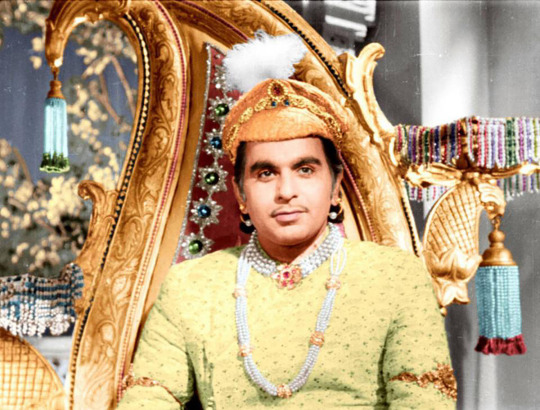
For every movie buff, the dvd release of a favourite film has great significance- the extra reels!! Scenes that were edited out, 'behind the screen' actions, interviews- there is a lot of stuff that we get to watch on the dvds and nowhere else (until some kind soul uploads them 😉😛).. However, a lot of the times, we are left wondering if the dvd was indeed worth our money. Of course, we get to watch the film whenever we want to, but what about the rest? If there is one dvd that gives buyers their money's worth, it is Jodha Akbar.
Ashutosh makes history even here; he is probably the only director who has had to edit out so many fabulous scenes from his film. Others are less unfortunate- they usually edit out unimportant bits, and even if those are good, most of the times, they are dispensable. In Jodha Akbar, most of the deleted scenes seem just the opposite. Once you have seen them, watching the edited version of the film feels somewhat incomplete.
The first scene that comes to mind is 'Jodha talking to her friends about Ratan Singh'. Yes, yes, we do not like Ratan Singh either! However, he is not the reason why we are mentioning this scene here, Jodha is. While the rest of the scene seems totally editable, Jodha's answer to her friend's question about whether she will willingly surrender to Ratan Singh proves that no matter how unimportant a Gowariker scene seems at first, one must never judge before it ends. In the film, we see a bold and opinionated Jodha breaking the stereotypical norms of her society and daring to express her unwillingness to surrender on the very first night. Naturally, when we saw the scene for the first time, we took Jodha's words at face value; we assumed she was not ready because of the forced marriage. However, the deleted scene proves that she would have done the same even for Ratan Singh. She would never have loved someone unless he gave him the resepect she deserved. What a woman!
Next in line is the 'Bidaai' scene, whose essence can literally be summed up in the question that Raja Bharmal's aide asks- 'Ye bidaai hai ya bali?' Jodha indeed is akin to a sacrificial lamb in this scene, and Aishwarya's tears express it all.
Of course, we are interested in Jodha and Akbar's interactions more than anything else, and in all honesty, that was why we all were so impatient for the deleted scenes to come out back then. And thankfully, we do get some unseen moments, although it would be wonderful if the entire 'deleted scene' reel had been just them! 😄😂🤩🥰
Horrified after witnessing Jalal's abject cruelty towards Adham, Jodha confronts her husband and reprimands him for his actions. She is shocked that he never even spared a thought for Maham Anga before taking such a drastic decision. Jalal, however remains adamant as well as furious, and maintains that Adham got what he deserved. Although initially unable to come to terms with it, she soon realizes his reason for doing whatever he did. As a broken and helpless Jalal confesses that if Maham Anga has lost a son, he has lost a father, Jodha understands the agony her husband is going through. Hrithik is brilliant, first as the incandescent Jalal, and then as the heart-broken one. As Jodha places her hand on his shoulder to console him, one can't help but wonder why this scene was edited out of the original reel! What harm would an extra few seconds or even minutes do? 😭
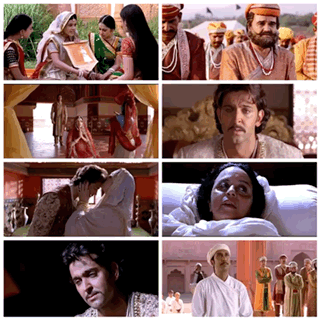
Then comes Mahesh Das aka Birbal. The two scenes through which Ashutosh narrates the history of Mahesh Das's transformation into Birbal are undoubtedly the jewels in the crown of the deleted reel. In the first, Jalal and Jodha meet Mahesh Das who cleverly prevents the emperor from hunting, much to Jodha's pleasure (and ours too). When he claims to know exactly how many birds there are in the land, Jalal tells him that he will be punished if he is wrong. However, Mahesh Das's wit is unparalleled and he rattles a random number. As Jalal and Jodha both look at him with surprise, he explains. If his answer is more than the actual figure, it will mean that birds from the neighbouring land have visited; if less, it will imply that birds from Agra have gone to visit their relatives. Naturally, both the emperor and the queen are impressed. Jalal gives his ring to Mahesh Das and asks him to visit the Deewan-e-Aam.
In the second scene, Mahesh Das visits the Deewan-e-Aam but encounters a corrupt guard who refuses to let common people enter the court without a bribe. When Mahesh Das shows him the emperor's ring, the latter allows him to enter on one condition- Mahesh Das must share half of whatever gift he receives from the emperor with him. Little does he know that he is talking to one of the 'would be' Navratnas of Akbar's court, incidentally one of the most famous ones! Mahesh Das agrees to his condition and asks for a prize of 50 whip shots from Jalal, much to his and evryone else's shock. When he explains the reason for making such a strange request, Jalal calls the guard and orders him to be whipped 50 times instead as a punishment for corruption, which he insists shall have no place in his empire. Fascinated with his wit, Jalal invites Mahesh Das to be a part of the Mughal court. However, Mulla Do-Piyaza objects, and Jalal gives him permission to test the former. If he is able to answer Mulla Do-Piyaza's question, he will be accepted in court. If not, he will be punished. That is the deal. Also, if Mahesh Das wins, then Mulla Do-Piyaza promises to bow before him every day. Jalal agrees, and so does Mahesh Das. After much deliberation, Mulla Do-Piyaza asks Mahesh Das to guess what he is thinking at the moment. Of course, it is an impossible task. However, Mahesh Das is not someone to give up; nor does he need to. His intellect is ready with an answer. He tells the court that at this moment, Mulla Do-Piyaza is praying to the All Mighty for the emperor's long life, good health and prosperity. Is there anything left for Mulla Do-Piyaza to do except accept defeat? 😂😂 Having proved his cleverness to everyone, Mahesh Das attracts appreciation from one and all, and earns a priceless reward from the emperor himself- the name 'Birbal' (meaning quick-witted or 'dimaag mein taaqat'). Having these excellently scripted, directed and enacted scenes in the film would have been worth the extra time!
Two more deleted sequences deserve mention. The first is the moment of Maham Anga's death. Jalal comes to see her as she lies on her death bed, frail and ill. We understand this is the first time he is interacting with her since the betrayal. If not for anything else, this scene should have been included only for Hrithik's exceptional performance, and of course for Ila Arun ji. As Maham Anga finally admits to Jalal that she had wronged Jodha on account of her overpossessiveness for him, and asks him to call him like he used to one last time, we see a completely devastated Jalal, not the Shahenshah of Hindustaan, but just a grieving son. As if she was waiting for that one word from him, Maham Anga passes away the minute Jalal calls her 'Badi Ammi' again. The scene is a strange mixture of melancholia and poeticness, and Hrithik's wonderful emotive capacity makes it one of the best bits of the whole film, both the edited and the unedited versions. On another note, how does someone look so handsome and flawless while sobbing? Is Hrithik even human? 🙄🤨😐😑🤗🤗🤗🤗🤗
The second is the scene when Jalal comes to meet Jodha and his mother before departing for the war with Shareefuddin. Jodha says she is praying for three lives- her husband, her brother Sujamal, and her sister-in- law Bakshi Bano Begum (Shareefuddin's wife). Nonetheless, Jalal vows to protect Amer, no matter what it takes. The scene is poignant and yet another example of the magical on screen chemistry between Hrithik and Aishwarya. Seriously, we deserve them again!!
In conclusion, we reiterate that we would not have minded had the film been half an hour longer due to the inclusion of all the scenes mentioned above
With that, we have come to the end of this blog. Hopefully, you will join us on our next too. Stay safe. Stay well.
Once again, this one is for you Dilip Kumar Saab. You showed the way; so, we have Jodha Akbar. Thank You Sir. May you Rest In Peace 🙏🙏
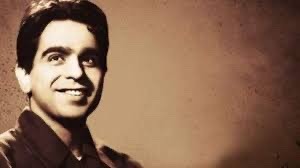
5 notes
·
View notes
Text
The Celtic Tiger: A Kaiserreich Ireland AAR Chapter 8: Not the World, But Our Place In It

8 January 1942 - Áras an Uachtaráin, Dublin, Ireland
The Internationale had been defeated, their leaders killed or captured, the exiles returned to their seats of power. The war was not over, not with Savinkov still in power in Russia; his aggression against Germany and Japan meant continued war. For Western Europe, however, the war was over, and it had been time for celebration. V-E Day it was dubbed, victory in Europe. In the Americas, Canada held grand parades, the United States threw a ticker-tape for MacArthur and Eisenhower, and Mexico lauded their great success from Baja to the Yucatan. In Europe, the west was abuzz with church bells, fireworks, and celebrations in the street. The hammer-and-torch had been defeated, it could no more tyrannize the people of the world.
For Ireland, this had been an even greater celebration. Before any of the other great powers had fought the syndicalists, they had stood alone against the red flood. One tiny island nation alone against the might of the Third Internationale, and they had fought like lions. Facing a foe that dwarfed them, they maintained their desire for freedom and backed their words with force. The author Winston Churchill had said: “Therefore, we should not say that the Irish fought like heroes, but heroes fought like the Irish.” Michael Collins, Richard Mulcahy, Tom Barry, and Dan McKenna had all been held up across the Entente as images of the successful stand against the syndicalist menace. None had expected Ireland to last more than a few months, but Michael Collins and the Irish Armed Forces had resisted them to the utmost, and had won. The courageous defense of the steadfast Irish soldier had shown the commitment to duty, and the hollowness of the syndicalist cause; that in the end they were just power-hungry ideologues bent on world subjugation.
Yet with celebration, there were sobering reminders of the costs and tragedies of the war. LIFE Magazine had snapped a picture of three celebrating in front of their destroyed home, a toddler on his father’s shoulders looking confused while his mother danced. While the Second Weltkrieg hadn’t been as long as the first, the worst days of the First were only average days in the second. Half a million French and British soldiers had become casualties simply attempting to invade Ireland in 1939. Between the European and Asian theaters, 1940 alone had seen almost 12 million dead, wounded, or missing, and 1941 almost 20, and that hadn’t counted the still-ongoing wars both in Russia and in the chaos borne out of the Deutsche-Mittelafrika collapse. Bombed out buildings and the rush of new cemeteries made that fact abundantly plain the terrible cost of the Second Weltkrieg. The United Kingdom and the restored French Republic had to rebuild their shattered countries, broken twice by both bombs and the misrule of their former syndicalist masters. Plenty of the young had been indoctrinated to believe that all who did not carry the hammer and torch were rapacious from the first, and now these young people had to watch as the monsters from across the sea landed on their shores, crushed their defenders, and took power in their new nations. Already the British and French had established wartime governing authorities to facilitate their return to power, to desyndicalize the population, decollectivize the property, and return their country to some sense of normalcy.
Collins kept quiet about his nation being used as a prop for the British and French after they had refused to help in 1939. He had no problem with Mosley and the Internationale being exposed for the evil bastards that they were, but that the great powers had held up the Irish dead to prop up their own regimes infuriated him. He had been prepared to work with the British and Germans who had abandoned Ireland. He had been prepared to swallow their inaction as they labored together for their common cause of defeating the syndicalists. Now that the war was over, however, it became a lot harder to stomach, and every speech filled with lies and empty platitudes came with it a fierce attack of heartburn. The talking heads in the Great Powers talked about taking heed of the stark lessons of 1939, without any recognition of what they did in 1939 and why they had done it. It was like Black Monday all over again; the world marvelled at Irish accomplishment without thinking, learning, or changing.
The aftermath had done what war could not; it made Michael Collins tired.
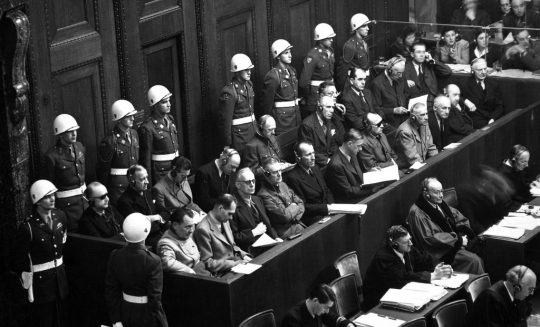
18 April 1942 - Internationale War Crimes Tribunals
1942 saw more than just a dawn of new governments, but the reckoning for the old. The newly restored French Republic and the United Kingdom had called for trials to prosecute the syndicalists who had taken over their countries in the 1920’s. The trials had promised to be far reaching; the senior leadership would be put on trial, as were the senior military commanders. That much was obvious, but the question of collaboration was an open one, and field-grade commanders, mayors, and political officers would all receive their own trial. The Entente were permitted one judge from any of their constituent member countries to accompany a French and British judge, while the Reichspakt were permitted to send two judges from any of their own countries along with a German judge. Ireland, in respect of their status as a non-aligned full belligerent power, was to sit as the seventh judge.
The charges were grave: war crimes to include the wholesale massacre of civilian populations, crimes against peace for their aggressive attack on Ireland, and an entirely new set of crimes devised for committing acts against their own population entitled “crimes against the principles of humanity and universal morality.” Writing for the prosecution, Norman Birkett, the Canadian judge, stated: “No currently used term can be considered adequate to address the sheer depravity committed by the Third Internationale as articulated by the Totalist Charter, in their consistent and unequivocal exhortation for the dehumanization and forcible conversion of all peoples that do not practice their tenets, and the rationalization that those who do not submit are to be exterminated. It is therefore necessary to devise a new construction of language so that we might better condemn such actions, and to take all efforts to ensure that they are never repeated.” This new category of crimes included the actions taken by the syndicalist governments against their own populations, not just the Maximist and Jacobin purges but everything dating back to the revolutions themselves. Rural farmers who didn’t collectivize, members of the clergy, workers who didn’t reach their production quota, the hardliners within the prosecution considered all to be victims of the syndicalist cause, and their persecution was considered a failure of government and the institution of such punishments a crime against humanity; a new concept in international law with serious implications for international justice.
The defense attorneys for the syndicalist governments had been the most vocal about these implications. The lawyers attacked the court’s legitimacy, claiming that the abject poverty that the working classes had been subject to in the early 1920’s, before the syndicalist revolutions, would likewise condemn the British and French governments. Citing observations from coal miners of the brutal conditions suffered in the mines and abuses that had occurred in the British Empire’s far-flung colonies like Kenya and Burma, the Union of Britain’s lawyers argued that crimes against humanity were a selectively applied form of victor’s justice, an attempt to provide a legal fiction to apply the maximum possible sentence and de-legitimize the Internationale’s purpose for being and the conditions that “made it necessary to seek an unequivocal solution to the problems faced by the working class.”
Michael Collins had been far more interested in the trials that concerned the Internationale’s invasion of Ireland, even if the Irish judge had to recuse himself from the proceedings. The initial invasion had been considered a crime against peace and few contested the judgment, and with Mosley having committed suicide, the Union of Britain’s cabinet had become the principal defendants. Of greater significance was Thomas Wintringham, who had led the invasion. Wintringham had stated that he had simply followed his orders, and that the legality or illegality of those orders were the responsibility of the commanders-in-chief that had declared the war against Ireland. He had also claimed that he had not issued orders to kill civilians, that those actions had been taken unofficially on the ground by enlisted men and junior-grade officers. His executive staff office, Wintringham stated, was blameless as they had not committed or sanctioned such actions to be carried out against the Irish people. The Irish prosecutor, Joseph Alfred Sheridan, had argued that Wintringham had supported executing Irish civilians as a means to pacify the population, and had actively ordered the commission of war crimes as a means to intimidate any partisan activity; Wintringham knew the difficulties the British suffered in the Irish War of Independence and had hoped to avoid a guerilla war with the IRA. The judges found Wintringham’s defense of superior orders an insufficient defense, and that he had not taken active measures to prevent atrocities under his command as was found guilty. The Collins government had taken custody of Wintringham, and in a final insult, ordered that the general be sent to the gallows instead of the firing squad; his conduct had proven himself to be unsoldierly, he was not permitted a soldier’s death. The “Galway defense,” as it came to be known, established a firm precedent in international military law, that soldiers and commanders were obliged to disobey unlawful orders and could be held vicariously liable for war crimes committed under their command.
Collins would have loved to have seen the Lord Lieutenants of Ireland given a similar drubbing, but he had kept his tongue when asked about the implications of the ruling. “We thank the court for their interest in the cause of justice for the Irish people,” he gave in a public statement after Wintringham’s execution. In private, Collins spoke with Richard Mulcahy, and had been far less sanguine. “I have a feeling that few will care afterward. The verdict makes them feel good about themselves, but Germany and Canada didn’t care about us in ‘39. How long will it be before Albert needs to take the Six Counties back?”
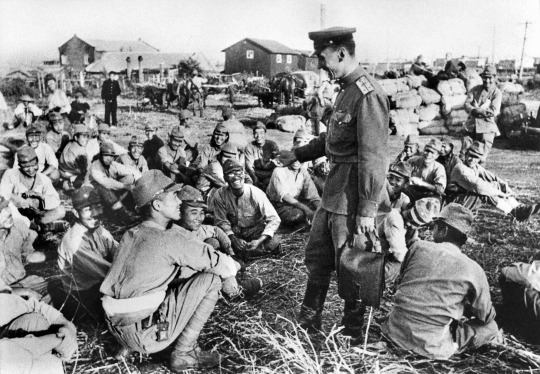
25 May 1942 - Vladivostok, Republic of Transamur
The war with the syndicalists was over, but that did not mean that the Second Weltkrieg had been over. Savinkov still waged his war in the east, and the Vozhd believed that nothing would stop his idea, one Russia under the Nationalist Populist People’s Republican Party. One Russia had meant that the Kingdom of Ukraine and White Ruthenia were illegitimate national constructs foisted on Russia by a victorious Germany in the First Weltkrieg, and Kolchak’s government across the Amur River, propped up by Japan, had to be conquered and integrated back into the Russian State. The Entente had most of their divisions at home to assist in the military transitional state, but had permitted volunteer divisions to fight with the Reichspakt on the Ukrainian front as part of the stipulations on the Halifax Conference. Canada however, had sent volunteer divisions to aid Alexandsr Kolchak in distant Transamur. The Admiral-Dictator had had a long relationship with King George VI, and his sons had maintained strong connections with the distant admiral and his claims to Russia. That relationship had been strained by his regime’s dependence on Japanese protection, and when Japan and Canada went to war for control of India, that support had dried up. Canada was nervous about supporting Kolchak, but he was likely the most favorable candidate for the Entente to lead Russia. One other country had decided to return an old wartime favor. Dan McKenna rode out to fight again with the 12th Hohei Shidan in the distant corner of the world.
The Thunderbolts had landed their IV-1’s in Vladivostok, and quickly saw to integrating their signal corps with the Japanese and Transamurian forces for better communication. It was cold here, and while the Earth was round, this had to be one of the forgotten back corners of it. The Russian forces had welcomed the Irish personally, reminding McKenna of when Douglas MacArthur greeted the volunteer forces in the Second American War sailing into the Chesapeake. There had even been a slight party, with the Russian civilians serving their Irish guests black tea and soup made from pickled cucumbers and pork kidney. All to welcome them to defeat “the madman in Moscow,” they said; the stories of Savinkov in Russia had been truly frightening. Non-Russians had fled Savinkov’s forces rather than be arrested. Japanese civilians in Russia had been one who had expressed their fears early, but the Cossacks in the Don, the Kazakhs, any who had cleaved from Russia were subject to Savinkov’s aggression. Kolchak had seized on the opportunity to welcome Mongolians, Koreans, and Siberian people into his small country to bolster his ability to resist an invasion, but he was still significantly outmatched. Kolchak’s forces were small, most of his manpower had been devoted to his navy to maintain control of the Golden Horn Bay. The Japanese soldiers made up by far the bulk of the armed forces in the east, but the Japanese Army had also been suffering from war fatigue, having stalemated not once but twice, lost their puppet government in Manchuria, and had been unable to secure resources in Indonesia to alleviate their significant supply shortages for fuel, iron, and bauxite. They had taken the lessons of the Second American Civil War well, investing heavily in artillery production and close air support planes.
McKenna’s Japanese had been limited to just a few short words he had learned, half out of curiosity and half out of professional courtesy when he worked with the 12th in Pittsburgh. But the Open for Business Initiative and the immigration reforms had greatly enhanced the number of people within Ireland, and finding Russian and Japanese speakers in Ireland in 1942 was a lot easier than in 1936. He still greeted the Hohei Shidan’s major general and invited the old guard among the battalion leaders for a brief drink to reminisce about the Second American Civil War. It had been good to see his old wartime comrades, but he had been shocked to see that some of them had rejected the overture, hostile now to their one-time friends. Perhaps it had been hard feelings over the war with the Entente and the Reichspakt that had translated over to hostility to all Europeans. It hadn’t been total, but it had hurt to see some of his old friends no longer willing to share a drink with him.
“One more war, here’s hoping.” McKenna, sharing a glass of whiskey and a carafe of sake with Masakazu Kawabe.
“You and I both know there will never be simply ‘one more war.’” Kawabe mourned. “But it is nice to dream. Let the Sword and Thunder ride just as we had done half the world away.”
Kolchak’s war council had suggested that the Irish’s best use was in exploiting breakthroughs into the operational depth of Savinkov’s forces. Dubbed “Kolchakian Deep Battle,” the plan called for disrupting and impairing the Russian State’s ability to reinforce trouble spots on their line, attacking and retreating after causing such disorder was perfect for the rapidly-moving Irish infantry vehicles. Near Vladivostok, there was little worry, the Russian East Navy could use their guns to assist and the Imperial Japanese Navy was happy to use their carriers to provide ground support to the forces on shore. The true trouble would come after they began to move inland. Savinkov would undoubtedly destroy the Trans-Siberian rail line once Transamur began to advance, and there were no air bases this far west save the ones in Vladivostok, meaning that air support and aerial reconnaissance would be next-to-impossible. Perhaps one airfield existed in Amur that could be used, the next wouldn’t be until they reached Chita, and then perhaps all the way to Irktusk. The only mercy is that the terrain would be flat, but that was of little comfort to the mechanics that had to modify the chassis for the armored recon vehicles that the Irish battle doctrine had depended on to respond quickly to opportunities within the line.
McKenna had been more concerned with fuel. The supply lanes were open, but the Dutch East Indies had been reluctant to sell much of their fuel, as it was needed in the Netherlands to assist in rebuilding after repeated Union naval invasions. The United States could help send oil, but it was a long way to Vladivostok from the refineries at Standard Oil. The further they would push inland, the even harder it would be to keep the Ivies gassed up. Kolchak even had horse cavalry to help with reconnaissance duties when necessary, reminding McKenna when the Irish Gardai had used their horse police to move troops quickly to cut off the invaders at Clew Bay. The Japanese troops had even brought over bicycle troops to help alleviate the reconnaissance shortage.
“If it’s stupid, but it works, it isn’t stupid.” McKenna mouthed Murphy’s motto, and got to work.
---
4 July 1942 - Irish Embassy, London, United Kingdom
The rebuilding of England, northwestern Italy, and France had been slow work, and many issues had to be worked out.
Desyndicalization had not been an easy process. Many of the local officials had professed ignorance about the forced labor camps throughout the Commune and the Union for dissenters, unproductive workers, and enemies of the centralizing factions that took power in 1936. The Jacobins in particular had been quite extensive in purging members of the Travailleurs and Anarchistes in a way that reminded French historians of the Huguenots during the French wars of religion. The Maximists too, had been ruthless in their removal of orthodox syndicalists and moderate socialists just as the latter in turn had been in their purges following the British revolution. The British public were of two minds of the affair: the hardliners had taken the stance that they had been rewarded in kind with their own previous cruelty, while the moderates had advocated that such cruelty was an opportunity to reconcile the people that had remained on the British mainland and rebuild the United Kingdom into a stronger, more unified country that could not be subject to the divisions of the 1920’s. As long as the people were under investigation, they were unable to work, and that had been a drain on governmental money and food supplies, things that were desperately needed for rebuilding. The Entente had been donating supplies to support the rebuilding efforts, but even then, it had been a long process. Most of the British mainland was without power, and the French countryside had been torn up, including valuable foodstuffs and medical supplies which had exacerbated the suffering of people in the countryside. Starvation and disease had run rampant, and every day someone suffered was a crisis of legitimacy in the eyes of the returning old governments. Who and what had to be punished to ensure the most proper course of justice?
The anxiety had been palpable to any observer, with the fear of backsliding into open civil war if the trials had descended into kangaroo courts. The fear of what would happen to be left behind in the transition was on everyone’s lips, not helped by the returning aristocracy who openly celebrated the notion that those who had stolen their homes and property would now receive their just comeuppance. The Hackhand movement was the most popular of these, an exile movement using a severed hand as their insignia, which called for those who had benefited from the mass collectivization of property to have a medieval punishment: a hand removed so that at a glance, all the people might know them for traitors and thieves. The Hackhands lobbied extensively across France and the United Kingdom, calling for the harshest possible punishments not just for the syndicalists, but for the people that remained in the Commune or the Union. Former soldiers would not be allowed to enlist in the new armed forces, pensioners would have their stipends curtailed unless they participated in reconstruction work crews, long prison sentences for those who had benefited from the syndicalist seizure of property and execution of political and union leaders were plastered over posters and shouted on street corners. The reconciliation movement was a diverse range of people, from sympathetic members of the working class, evangelicals preaching forgiveness, and realpolitik practitioners who considered the loss of so much human capital to be a loss for the new world to come. Just as diverse as these movements were the measures prescribed. The most radical advocated for blanket amnesty for all non-political officials, while others advocated for lenient sentencing primarily served through serving on reconstruction work crews. The workload was hellish on the bureaucratic clerks who worked with little power or investigatory support. De-syndicalization certifications were sold on the black market, which caused repeat investigations and more than one major criminal slipped away.
The de-syndicalizing nations each ended up taking a different course. Italy, which had its territories divided up between Sardinia, the Kingdom of the Two Sicilies, and the Italian Republic, had been largely lenient, punishing the Sindacalista leadership and major organizers, while lower-ranking members were given prison sentences ranging from three to ten years. France had pushed harshly, with significant prison sentences and executions for top-ranking members. France also labored to tear down Commune structures and edifices to erase them from their history. It rebuilt the Sacre-Coeur which had been destroyed by the Communards to be twice as large, and in recognition of the African colonial troops and conscripts that had contributed to the successful retaking, had ordered a grand mosque to be built and dedicated in the Metropole; the first of many steps toward the integration of the African colonial territories into a new French Union. Free unions were abolished with new religious and state-controlled secular unions instituted in their place, with severe restrictions placed on political activity. The only exception was Georgiy Zhukov, who had proven that he had conducted himself according to the laws of war. Thanks to a petition by Tom Barry, Zhukov was simply exiled from France. Barry had offered him a place in Ireland, where he spent his days writing on infantry tactics and fishing in the River Shannon. The United Kingdom, swayed by its foreign policy advisors, had severely punished the leaders of the Union, both the Maximists and the leaders of the others which had survived the purges, along with members of the Labour Party which could be linked to pro-Union activity, but the party itself was not abolished and permitted to run in free elections. The aristocracy largely had been compensated for the loss of their property, and most of that compensation had been placed into deferred payment schedules to facilitate further rebuilding. Many of the former syndicalists had been put to work rebuilding the Royal Navy and Royal Air Force to build the United Kingdom’s military, to get Canada to send its troops back home.
Normalcy began to return to Europe. The Germans had provided a large financial package to help France rebuild, and Mitteleuropan member states had likewise contributed smaller amounts. The Entente had been vigorously donating to help rebuild the British Home Isles. There was a small sense of something optimistic returning, after so much death and destruction. Yet Michael Collins was still nervous. This sentiment did not last after the Second American Civil War, and it wouldn’t last here. Once the Russian State was defeated, where did that leave the rest of the world?
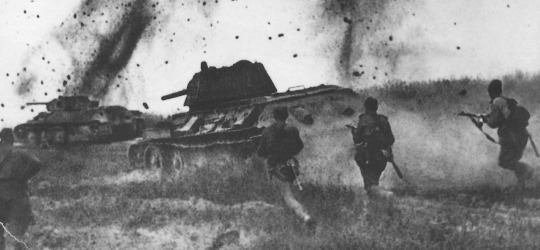
13 August 1942 - Chita, Siberia, Russian State
The Russian State was an exercise in fury. Savinkov was outnumbered and beaten, and he knew it, but the question was: how long would it take?
The sheer size of the Russian State had made the war long, and as supply shipments began to get more and more irregular, it became harder to maintain a high combat tempo. In the west, the Reichspakt had slowly but surely pushed the Russians back, retaking Kiev and Minsk before crossing the border into Russian territory. On the eastern front, the terrible roads in eastern Russia chewed through the front tires of the half-tracks and motorized artillery units. Air cover was sparse, the An tAerchór had designed their fighters and CAS aircraft to be light in order to maximize maneuverability in the air. When a plane was made lighter, it either sacrificed fuel capacity, or it sacrificed armor, and the Irish had opted for the former. The short ranges across the Irish Sea had made the decision simple, but in the vast expanses of Siberia, it meant that often, Dan McKenna and the 1st Thunderbolts advanced without the benefit of air superiority or close air support. This had become a significant problem, as the larger Russian aircraft flown by Savinkov’s pilots could make the trip from Irktusk to Chita and back.
Ireland had relied on its fighters to maintain air superiority, the nimble fighters made by Aer Lingus had developed a reputation for impressive dogfighting. Without them, McKenna had been forced to rely on nightfighting to advance, and reconnaissance often meant paying informants for intelligence that was frustratingly hard to confirm. When it was necessary, the field engineers had bent the mount on the Ivy to have the autocannon held at an upward angle. It had completely ruined the fighting potential of the IV-1 against ground forces, and after a few shots, the mount could warp, even potentially jamming the gunner against the rear of the seat.
It had made McKenna worried. Irish military doctrine prided itself on mobility and rapid response, but air power would always outspeed ground vehicles, and so without the ability to engage on the air in equal terms, their key advantage had been lost. Unlike the Union or the Commune, Savinkov had ensured a unified structure from the ground up; these were no militia units struggling to adjust to a professional command. Savinkov had devoted plenty of aircraft to ensure that he could fight with air superiority, but he could not devote the manpower to fighting in Siberia when the German Kaiserreich pressed the advantage in the west, threatening the more valuable western portions. Had it been in the western front, near Petrograd, the sheer numbers of Russian State forces would overwhelm the ineffective Ivies now hobbled by their improvised anti-air guns. The only thing that kept McKenna’s lines from being overrun was that there were other theaters that were more important.
“Push to Irktusk, Kolchak says. We move at a crawl out here. Tell Kolchak that if he wants Irktusk so badly he needs to bring us some damn diesel.” McKenna complained in his forward command post.
Kawabe sighed. “Most of our aircraft are operating under similar restrictions. We primarily built them for our carriers. I suppose it’s bitter irony that I was the one who had pushed for carrier designs over larger twin-engine designs.”
McKenna laughed. “Doesn’t do us any good now. We’ll have to stick to night raids, and just hope that the western front can collapse the defenses at Moscow before we have to push all the way to Ekaterinburg.”
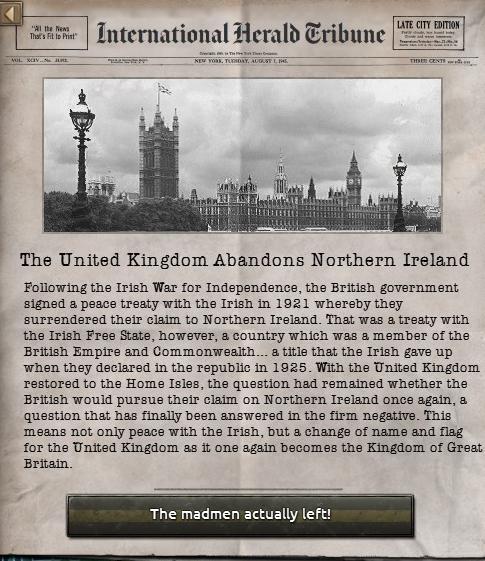
21 August 1942 - Áras an Uachtaráin, Dublin, Ireland
“While the government has returned, there is no going back to what was done before; we must endeavor to learn what we can from the past and ensure we do not repeat our previous mistakes. These years of war and rebuilding have shown us many things. We have seen the rows upon rows of gravestones. We have seen the faces of the wounded and heard their cries. But we have also seen acts that define what it means to be a Briton. We have seen people come together and share the little food they have so that none may starve. We have seen men bravely continuing their work to help rebuild knowing that it gives one more family a good roof over their heads to sleep. We have seen volunteers delivering wood and fuel to the aged just to make sure that they are warm, even if it means they cannot start their own fires. And we have seen old enemies bury the hatchet of their grudges to work together toward something good. The small nation of Ireland had little reason to aid the exiles of Britain, our history and conduct toward them was shameful. Yet, when the time came to take the fight to Mosley and his Maximists, it was an Irish negotiator who helped bring cooperation between the Entente and the Reichspakt, there were Irish mechanics helping to service British bombers at the airfields in Derry, and there were Irish soldiers that fought alongside English ones. The Irish extended a hand because they saw who we were, our struggles, and saw some manner of kinship. We also saw, when it came time to look after the Anglicans in the North, it was the Michael Collins government that ensured that their rights were respected, even if it meant punishing his own citizens. It is only fitting and proper then, that we continue to uphold the peace with Ireland and recognize its contribution to our own success. I therefore maintain that the previous treaty fixing the borders and securing independence with the Irish Free State be extended and confirmed to the Federal Republic of Ireland. The Six Counties are, and forever shall be, Irish possessions. As we come to a new age, we raise a new flag, and declare that we are Great Britain.” -King Albert I
Michael Collins couldn’t believe it. If he hadn’t had dropped his book on his toe, he would have thought he had been dreaming. The English had surrendered their claim to the Six Counties.
Impromptu jubilant celebrations had broken out across the entire country of Ireland. The question of the North had finally been resolved, in Ireland’s favor. The Second Weltkrieg had done what no one ever thought possible, confirmed Ireland’s place in the world. The Celtic Tiger had reared and roared, and had defeated Black Monday and the Union of Britain. Ireland was truly the diamond of the world, there was nothing that seemed to be beyond Ireland’s grasp. She stood between both Entente and Reichspakt, enjoying favorable status with both power blocs. Her economy was booming, her people well-fed and happy. With this final confirmation of her territorial integrity being respected by her longtime foe, Ireland was finally free of the shackles of the past, into a bold future. Already, there had been talks for new Irish initiatives. The French Republic had looked to meet with Ireland to establish diplomatic clout to reform Mitteleuropa to be a more equitable organization, the Kaiser Wilhelm Society and the ISAC had sought to improve research sharing opportunities with ESIC, perhaps even securing German and British relationships the way that Ireland had established one with the United States. Even Italy had hoped for Michael Collins to help mediate the idea of an Italian Federation to possibly fix the tensions between the Entente-allied Kingdom of Sardinia-Piedmont, the Austrian-allied, Italian Republic, and the Reichspakt-aligned Kingdom of the Two Sicilies. If the First Weltkrieg found the Germans their place in the sun, the Second was a time for Ireland to stand in the light.
This place in the sun had not been easy. There were many Irish dead, many more permanently wounded in the struggle. Galway had needed to be rebuilt after the extensive damage. All of that was manageable. There was one thing, however, that was not. The Irish Republic had been the dream of the IRA since the beginning, and for most every man, they could say that they achieved it. Collins knew better, and knew about the elections of 1937. What frightened him was not the conditions, but how easy it was to do it. With two glasses of Acushla on his table, he summoned his old friend Richard Mulcahy to an impromptu meeting.
“Richard…” Collins had said, his voice barely audible. “I think it’s time for me to retire. I don’t think I should run in ‘42.”
“Sir?” Mulcahy had been surprised for the first time in a long time.
“I’ve led Ireland for a quarter-century, I have a feeling that even if Jesus Christ himself ran for Fianna Fail, I’d probably get more of the vote.”
“They love you, Mick. You led us through the entire thing, and you’re leading us now.” Mulcahy, the color draining from his face, tried his best to laugh off what Collins was saying.
“I truly believed it, you know. I thought that there was no way in hell that they would abandon their claim to the Six Counties.” Collins took a small sip of his whiskey.
“No one blames you for that. It’s right to worry.”
“It’s certainly not presidential. I’m a dictator, Richard. I’m not Mosley, but the longer I stay here, the more that we’ll backslide once I do leave. We need to be a republic in every way, and I’m in the way of it. Ireland needs to be free. Even from me.”
---
Images
Successful Victory
War Crimes Tribunal
The 12th Hohei Shidan in Siberia
The Slow Advance
The UK Abandons Northern Ireland
It’s over. I was a bit sad in writing this. It was a lot of fun, and frustrating in parts, and I wanted Collins’s conclusion to reflect that. A happy ending, with a bit of sad parts, to reflect the triumph of the playthrough. I’ll be detailing an appendix to really flex some worldbuilding muscles, but I’m happy that you shared the journey with me. Have a good one everyone.
-SLAL
15 notes
·
View notes
Note
Ok so Pariston has taken a liking to someone but they’re uninterested in him. He tries to talk to them and they excuse themselves. He flirts with them but they politely refuse. He plays mind games but it reverses and THEY start to psychoanalyze HIM. Is he the type to get more infatuated, or become bored and stop, or threaten them, or continue on teasing like this...? Theories?
Damn dude im gonna have to call the hxh expert @ramwrites for this.
Holy h*ck, it’s been a hot minute since I’ve done anything hxh related. Pariston, in my humble opinion, is one of the worst yanderes to have. But I digress.
Pariston adores destroying the things that are the most dear to him - a sadistic compulsion that, unfortunately, extends to his darling. He wants nothing more than to gleefully break them, to have them crumpled at his feet. He craves their hate, he wants to instill them with such insurmountable loathing for him.
But that result is so much more satisfying the more they resist. If anything, it’ll make his pursuit increasingly tantalizing. He’ll chip that spirit away - destroy every ounce of that determination and confidence, all with a glittering smile upon his face.
He’ll cease the facade of traditional courting, instead giving them no choice but to give in to him. A lost job, a burglary, a death of a beloved family member; mounting tragedies that Pariston won’t even try to deny his evident involvement. He loves to see firsthand their downward spiral into abject misery, how their feisty resentment grows. He’ll eventually whisk them away, opting to make the task of breaking them much more intimate.
Sure, the chase may be a tribulation, but it’ll all be worth it when they’re broken before him, an empty, hollow shell devoid of that fire that tempted him so. they’ll have nothing, they’ll be nothing but a vessel of pure hatred.
It’s better than he could’ve ever hoped.
#pariston#yandere pariston#hxh#yandere hxh#hunter x hunter#yandere hunter x hunter#concepts#yandere concepts#yandere theory#yandere imagines#hunter x hunter imagines#pariston imagines
117 notes
·
View notes
Photo

19. Flip The Script: Change one DRASTIC trait about your character and write a one-shot. (A character who is a Magick is now a Mundus or vice versa; a character is suddenly born in an entirely different place; a 15-year-old is a 51-year-old etc etc.)
In which Gregory Eeyore is forever scarred.
All his life, Gregory had always been pushed down, walked on and abused. He’d been told time after time that he was weak. Spineless. Pathetic. A nobody. Never going to amount to anything, or would never have the capacity to get far. He knew what people truly thought of him in the sneers and the looks that were given towards him. The way that people like Toulouse and Hades would lift their brows at him - the judgement evident even if often the former never even gave him the time of day. The snark and slipped in insults that often accompanied a conversation did enough.
Too stupid. Too young. Too Naïve.
But for twenty two years of his life - Greg had done little more than ignored it. The words and actions affected him mentally, but never did he let it change him. He wouldn’t let it. After all, if showing kindness and compassion for the people of Swynlake, regardless of gender, identity, magical status and more was weak and spineless - then that was fine with him. Gregory Eeyore would never stoop to the other people in town’s levels. Never wanted to harm another person or even hurt their feelings. That was just too far in his mind. Instead, he would always fight for justice, and change. He’d stand tall and in front of those being affected - stand by their side to fight for their rights and freedoms too. All Gregory Eeyore ever wanted was for Swynlake to be a home for everyone like it had always been for him.
But.... something changed the night of the Town Hall Mixer.
Like a small thread in the back of his mind had snapped, and with it - the compassion that normally shined so brightly behind blue eyes was forever dampened. He’d barely survived the two stab wounds to the gut - rushed to the hospital in a string of events the young man would barely come to remember. The details that would slowly fall into place within the next coming days didn’t help him piece together a fond memory - and easily Gregory felt himself turning more and more bitter in his recovery.
Visits were quickly shunned - a refusal to see anyone, even those he considered his friends. Texts went ignored, and all too quickly Gregory simply turned his phone off and didn’t bother reaching for it for weeks. Instead, the boy wanted nothing more than to sit in the hospital himself, brewing in the information he’d been getting and putting together what had happened that night. Not even his mother could break through his train of thought and pull him from the darkness that circled all too viciously within his mind.
Vampire. Compulsion. Mass chaos.
How quickly his tiny town had once again been subject to horror. To some unthinkable tragedy - and this time Gregory had been caught right in the middle of it, and for what? There had been no reasoning behind the attack. Nothing, but the thrill for chaos. The Vampire (Anthony, he’d later discovered) might not have had an intention at all - if not just for Swynlake to turn against each other.
Mindless... pointless violence.
For once in his life, it felt easy to point that finger. To lay the blame on someone or... something - the blame that Gregory realized he was placing where he never thought he would before.
On... Vampires in general.
It was their fucking fault all of this had happened, after all. How could they ever think they could control a group of people so powerful that they could just warp your mind to believe whatever they wanted? That they’d been the very same people to trick his ex-boyfriend into thinking a dog attacked him when they snacked off of him after work. Vampires were the whole reason he’d lost so much - and nearly more that night.
A vampire had just controlled more than half the town - just like that. Which.. was terrifying. It was terrifying and it made Gregory angry.
....and it didn’t just stop there, did it? No.. Perhaps people were right all these years. He was far too naïve. He’d let this go on for far too long and never realized he’d been in danger his entire life. No one else went through the same trauma’s that Swynlake went through... and slowly Gregory was piecing together why.
It was always the fucking Magicks, wasn’t it?
Magic had ruined everything. From the stupid dreams that still plagued him and caused him nightmares, to the bugs, the chaos, the forest trying to take over. There had always been something or someone behind it. Soleil, for example could have killed people - and... did she ever pay for what she’d done? No. She’d hidden as a tree for years before coming back. Greg had accepted her with open arms and for what? She’d been just as responsible for a mess that could have killed people as Anthony was for nearly getting him killed now!
Something needed to change.
Magicks needed to be stopped.
- - - - - -
It was a good month until the first board meeting after the disaster. Gregory had finally shown his face in public since the incident - and while his fellow board member’s greeted him warmly, Gregory only stared coldly ahead with a nod. He had no intention on wasting anyone’s time. No intention on idle small talk or stupid jokes. Not when so much was on the line.
“I’d like to revisit a petition.” Came Greg’s words near the end of the meeting, his tone firm - without the hesitation or anxious stutter it normally possessed. A moment later and Jun’s old petitions, now revised and stricter than before with a few of Greg’s updates, was pressed across the table - his index finger tapping against it lightly before he sat back again. “...I want you all to think long and hard about this. We’ve ignored it for too long.” He spoke again, pushing back from his seat and pulling himself to a stand with a brief look at each of them - noting the confusion that melded into abject horror as gazes finally skimmed the paper in front of them.
PETITION: Swynlake Dangerous Magick Persons Residency Act II PETITIONER: Gregory Eeyore DESCRIPTION: ARTICLE ONE: Swynlake Town Board should vote to enforce a mandatory residency restriction for Dangerous Magick Persons. ARTICLE TWO: Swynlake Town Board should vote to enforce a mandatory and permanent eviction of any Dangerous Magick Persons within Swynlake. ARTICLE THREE: Swynlake Town Board should vote to enforce a mandatory Magick Registry for all remaining Magick Citizens, with public access. Dangerous Magick Persons will be defined as any person, human or humanoid, who has been convicted of any felonies and/or misdemeanors due to magic abuse, as well as persons whose magic and/or magick status results in or threatens harm, such as, but not limited to, vampires, lycanthropes, necromancers, various fairy talents, demons, etc. A person who violates this subsection commits a felony of the third degree and will be punished under the court of law and is subject to immediate eviction, and under worst circumstance execution. No citizen of Swynlake should ever be harmed via a Magick-caused occurrence ever again.
Gregory didn’t bother to wait around for their responses. He knew what it would be - knew that everyone on the board was far too spineless to ever do what needed to be done for the protection of their town. His town. Not a single one of them would ever have the guts to do what had to be done for the good of Swynlake.
But it was fine.
As Gregory walked out of Town Hall, he easily slipped his hand into his pocket - fingers running over the sharp blade that rest there. Blue eyes looked up again after a moment, and found Toulouse waiting for Hades nearby. Werewolf. Dangerous. His fingers tightened, wrapping around the hilt of the knife as he pulled it from his pocket with a tilt of his head.
He would just take care of it himself.
#bdrpwrimo#bdrpwrimolauren#x; Wrimo#tw implied violence#tw stabbing mention#this wasn't my original idea#but it's a very extreme version of a struggle he's actually going through currently#it's also just awful idk how to write one shots but I had this and wrimo is ending so i can't just not post it lmfao
1 note
·
View note
Text
On The Twentieth Century ~ Snow Troupe 2019
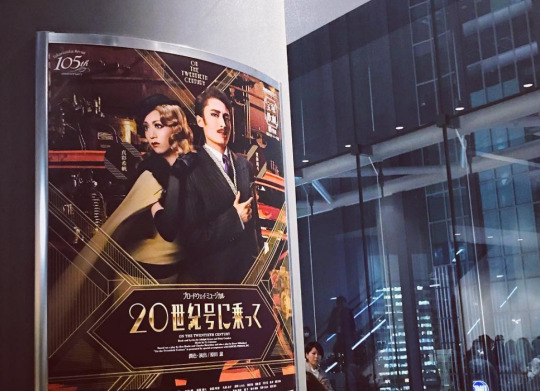
Oh boy. Oh dear. If you'd like some background, here is a fairly comprehensive Wikipedia summary, but since all signs point to this show disappearing forever (a tragedy), I will do my best to go through it roughly scene by scene in hopes of extending the memory.
“Perfect” is a word I’m still reserving for A-cast West Side Story ‘18, but boy is this close. It’s exactly what I’ve been waiting for, what in my wildest dreams I wanted Daimongumi to be, and feared it might never be. It’s hands down the best time I’ve had with my beloved Yukigumi since Chigi retired, and god I hope they continue on something even VAGUELY resembling this trajectory (tragic nihonmono, not optimistic, but,,,). I hope I can convey even a fraction of the joy that is this show.
Firstly, although it is the site of the first time I ever saw Komu live and thus a house of very treasured memories, I do NOT objectively like Theatre Orb. The third floor is too high for musical theater, the back of the second floor should not be A-seki, and the sound is abysmal. Unless you’re close to the front on the first floor, the instrumentals overpower the vocals, and everywhere I sat, including a pretty good S, there was an unpleasant echo. Like, if you can tamp down the power of DAIMON’S voice, something is wrong with your acoustics. The only time I had an improved experience I was on the extreme side of the 4th row and basically hugging a speaker, but if that’s the range for decent audio it’s a problem. And for some of the impressive songs in this show (and also just for Japanese comprehension of the speedy dialogue), it was a shame.
Everything else was outstanding. I can’t describe how WONDERFUL it was to hear Yukigumi, the tragedy troupe no one asked for, get not just giggles but consistent roaring laughter again. The overall casting—both in taking a chance on giving this troupe this show, and assigning roles to some maybe unexpected people—was brilliant. I’ll get more into the individual performances as I go through the story, but in quick summary:
Maaya was absolutely the star, in both the weight of her role and the extremely satisfying application of her many talents. Lily is, in my opinion, unquestionably the crown jewel of her Takarazuka career so far, and if something ever tops it we’ll be luckier than anyone has any right to be. I’d kill for more of this treatment going forward; she’s talented enough to carry a show, and I think the dynamic of the entire troupe improves when she’s in this strong of a position.
Daimon, whom I love to death, was SO above and beyond what even I thought she’d be able to do with a comedy; I always suspected she could pull it off IF she had the perfect formula of support (which I wasn’t confident the current Yukigumi lineup could give her), but she was SO good and SO in charge and SUCH a tone-setter for the entire comedic situation, I was truly blown away.
Owen and Oliver are in my opinion the juiciest roles after Lily and Oscar, but maneuvering around rank to cast Aasa and Manaharu was brilliant. Aasa has been average for me after leaving a huge impression in Robespierre, but her performance as Owen was back to MVP status, and Oliver is an absolute jackpot role for Manaharu, who rarely gets to do much of anything.
I wouldn’t have wanted to see Saki in any role but Bruce; he’s the big dumb just-a-pretty-face movie star, the butt of many jokes and the most slapstick of all the roles, and her exaggerated physicality was I think better suited to that style of comedy than the quick banter in the Oscar/Owen/Oliver group (also, for the sake of their dynamic, I wouldn’t have wanted Bruce to be someone physically smaller than Oscar).
That put Shou, who conceivably could have been cast higher, in the leftover train conductor role. It’s not as exciting a part, but it was perfect if only to clear the way for the other casting choices. She got to be the center of several musical numbers, and she got to tap dance!
After a little introductory tap number by the four main train boys (Tachibana, Suwa, Manomiya, and Seika), the show opens with famous Broadway producer Oscar Jaffe’s right hand men, Owen (Asami Jun) and Oliver (Mana Haruto), running from an angry mob of unpaid theater crew from Oscar's most recent abysmally failed production (again!). They all but crash into Daimon cameoing Al Capone (because Chicago in the 20s!) as he’s escorted away by a policeman. Owen is more laid back and pretty much always drunk; Oliver is high strung and also prone to drinking. As far as my off-the-cuff brain will take me, Aasa and Manaharu have not had much experience playing off each other, but they worked SO well together. They were so funny, so in sync, perfect foils for each other’s characters, even physically similar enough that they just really looked like a matching set of long-suffering assistants. Since Owen and Oliver don’t have any money, they give the angry mob the slip, and read a note from Oscar instructing them to meet him on the 20th Century Limited, a 16-hour luxury train ride from Chicago to New York, and secure Drawing Room A. Then we go into the prologue number (pics are from the little bit of digest video and like one online article they gave us).
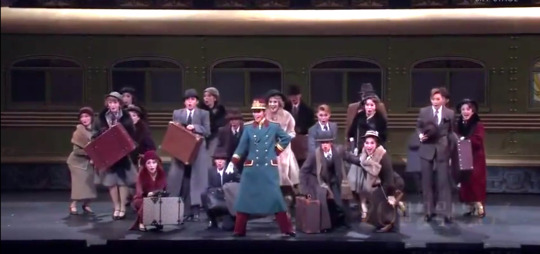
Although in retrospect I think it kind of subconsciously stressed me out the first viewing, I LOVED the music and choreography in this. Almost all the numbers mimic the rhythm of a train chugging along, and much of the choreography—when it isn’t just tap literally designed to sound like a train—has a feeling of commuter busyness to it. It wasn’t just on theme, it also enhanced the chaotic screwball atmosphere.
Owen and Oliver board the train to find Drawing Room A occupied. When their best middle-aged-white-lady-insisting-to-speak-to-a-manager voices claiming (falsely) that they booked the room weeks ago failed to work on the train staff, they deduce from some nearby luggage that Drawing Room A’s occupant is Congressman Lockwood (Touma Kazuki in a hilariously disgusting fat suit and combover with her shirt sticking out of her pants at all angles) reserved under a fake name. Suspicious, Owen and Oliver burst into the room under the pretense of delivering said luggage and catch the congressman fondling his much younger secretary (Sara Anna). They win the room by threatening to leak what they saw if he doesn’t leave—Riisha scrambling around in such a disheveled huff while Aasa loudly counts down from ten. Score! But just then the train starts moving and Oscar is still nowhere to be found.
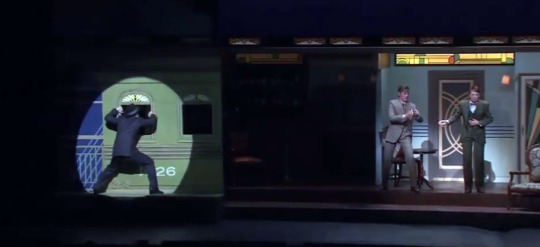
Whoops. He loses his hat, Owen and Oliver pull him through the window, and despite his abject failures in both life and train boarding, he lands dramatically front and center, all pomp and ego, waxing lyrical about the glory awaiting them in New York. Poor Oliver, despite being generally more sober and organized, is also more abused.
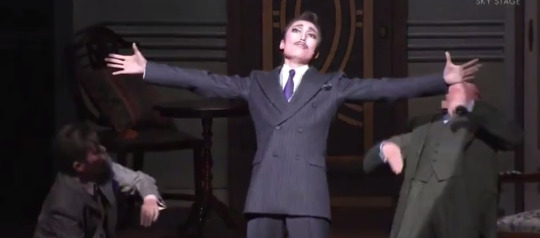
Daimon, always so delicately pretty and deeply sad, nailed Oscar so hard I don’t have nearly enough words for it. Her eye makeup was stern and crazy (and pretty monochromatic, nice touch for the 20s vibe), her mustache was GROSS, her neurotic mannerisms were so on point and so funny. She AD LIBBED!! WELL!! I was CRYING of laughter on senshuuraku, and she wasn’t just reacting; she was DOING THE AD LIBBING. The way she fidgeted and flailed and whimpered and yelled and modulated her voice WAY high and back down again to drag us though Oscar’s manic journey was just soooooo perfect. Not that I had any doubt she’d kill the songs, but they were hard, so it was all the more impressive. As perfect as Aasa and Manaharu were together, the three of them played flawlessly off of each other too.
Interrupting Owen and Oliver’s failing attempts to convince Oscar that they are in fact heading for insolvency rather than glory, the conductor informs the passengers that they are approaching Englewood and Oscar flips out. He reveals actress Lily Garland, his former protégé and lover, is boarding there and will be staying in Drawing Room B. He gleaned this information from a bellboy who told a maid and stalked Lily onto the train without her knowledge, but insists that in the 16 hours to NY he’ll be able to convince her to star in his next show, solving his financial problems. Owen and Oliver are Stressed.
This leads into my absolute favorite progression of scenes: a flashback introducing how Lily and Oscar came to meet. Oscar is auditioning Imelda Thornton (the goddess Satsuki Aina) for the role of Veronique, a Parisian street singer who refuses to sleep with Otto Von Bismarck so he attacks Paris and starts the Franco-Prussian war as revenge (men!). If only the photos from this scene showed the parts I want; Daimon was SO funny. Imagine like, the face you make when you try to give yourself 8 chins and take the ugliest low-angle selfie you can. Daimon was that + a thousand-yard stare of skepticism, fidgeting neurotically and tapping the arms of the director’s chair, with Oliver and Owen standing behind, simultaneously goofing off and keeping things running smoothly. Also in the picture at this point: Max Jacobs (Agata Sen), a successful Hollywood producer trying to sign Lily in the present, but in the flashback, Oscar’s (later fired) useless assistant who can’t even take Imelda’s coat correctly. Imelda, an all-ego-no-talent diva, is freaking out because her regular pianist was sick so she had to hire a substitute last minute and she’s late. Enter now Midred/soon to be Lily (Maaya) through the audience, in oversized glasses, tacky pink house dress, and matching hair cap, dropping her sheet music all over the place. Imelda is furious, Oscar is disgruntled, Max is Stressed. Mildred sits down at the piano, Imelda declares she’s going to sing “The Indian Maiden’s Lament,” and tries to begin but Mildred is still dramatically warming up her hands and shoulders. Finally she gives the ok and starts playing something completely different (Imelda, furious; Oscar, melting into a pile of gooey discontent).
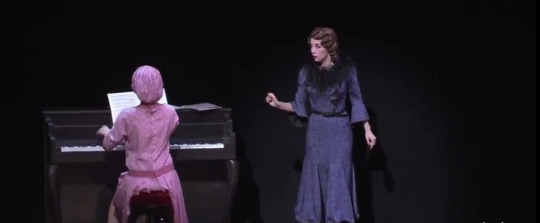
Take 2, Mildred begins playing the correct song beautifully, while Imelda sings horrendously and Oscar tries violently and wordlessly to convey to Owen and Oliver in moments of Imelda’s averted gaze that they need to stop this somehow. Imelda hits a sour note that’s just the last straw for Mildred, and she stops playing and corrects her (gorgeously, flawlessly, Maaya’s voice is a treasure). Imelda, flustered, thanks her and tries again, but isn’t any better. Mildred keeps stopping and correcting her, eventually just singing the end of the song herself, while Oscar, moving his chair closer with hilarious little Flintstone car footsteps, stares at her agape and then gives her a standing ovation. Imelda loses her cool and fires Mildred on the spot for ruining her audition; Mildred hulks out and demands her pay for the day plus train fare (Oscar, fully Team Mildred at this point, is mimicking all her movements behind her). Imelda pays and storms off, telling her assistant to call her an ambulance. Just as Mildred starts packing her things to go, Oscar declares he wants her for Veronique and asks her name.
I wish I could share with you all the sound that both of them made saying “Mildred Plotka,” pronounced “Mildred BLEGCH” with copious spit. I’m embarrassed to admit I just spent a good 30 minutes? trying to chase down a vivid childhood memory—I was 11, and watching Spaceballs on TV with my bff, and in the combing the desert scene they censored “we ain’t found shit” not with a bleep but with some absurd SCHMUSCHSG noise, and my bff and I laughed for approximately 8 days, because we were 11 and probably eating Gushers—and in my memory this and Mildred BLEGCH were the exact same sound, and I wanted you to experience it so much I watched every combing the desert clip on youtube fruitlessly, hoping one would be this exact censorship (sorry... I’m just... Daimon was funny??? and I’m very emotional about it????). Anyway, since no one can say Mildred BLEGCH, Oscar decides her new name will be Lily Garland. After some hemming and hawing about not being an actress, Lily decides to give it a shot. The house dress tears away and we have the snazzy number “Veronique.”
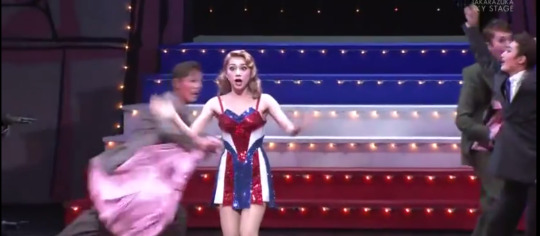
Maaya was absolutely brilliant throughout the entire show, but this number hit me extra hard. Not only was she exceptional vocally through a very challenging song (dancing all the while), but her aura of a freshly hatched starlet, packed with youth and hope and freshness and naiveté and raw unpolished talent, contrasted so vividly with the successful Hollywood actress still fueled by Mildred Plotka spitfire that we see in the rest of the show; I found it VERY striking. It was subtle but so effective and truly masterful acting. Veronique ends, Daimon re-enters from the audience and tosses a bouquet (the first time I saw it she missed the stage, and Maaya, fully in character and without missing a beat, just parkour’d off the stage and grabbed it and hopped back on), and we’re ushered back into the present.
The conductor enters Oscar’s room to inform everyone that a religious nut is vandalizing the train with REPENT FOR THE TIME IS AT HAND stickers, but not to worry because they’re doing everything they can to catch the culprit; and to drop off a play that he’s written about a day in the life of a conductor (to Oscar’s annoyance). Then the train arrives at Englewood station, and Lily boards with a flurry of paparazzi, her assistant Agnes (Chikaze Karen), and her attention-whoring movie actor boyfriend Bruce (Ayakaze Sakina). Maaya (in a GORGEOUS dress) is instantly the Hollywood diva instead of the wide-eyed starlet; Saki is the comic relief in what’s already a screwball comedy. Oscar is a terrible person, so if you can imagine how big and dumb and sappy and suffocating and clumsy Bruce has to be to make you root for Oscar, Saki was all that.
The two lovebirds put on quite a show of excessive PDA for the photographers while Agnes rolls her eyes, until it’s time for Bruce to leave the train.
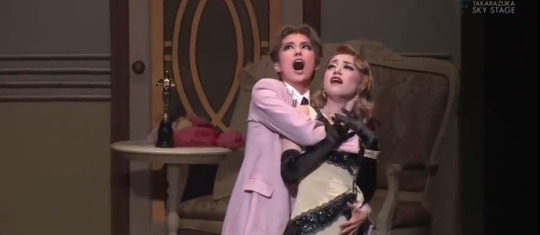
Lily falls to the floor dramatically, wailing oh WHAT will I do without him, when Bruce bursts back into the room, declaring he can’t possibly let the love of his life go to NY all by herself (Lily, all sorrow a minute before, is not 2 seconds later annoyed to see him). So he’s now along for the ride to witness Oscar’s whole scheme.
Owen and Oliver, trying to take matters into their own hands, show up in Lily’s room to beg her sincerely to do a play with Oscar, hoping she’ll pity him and his dire financial situation enough to do him a favor.
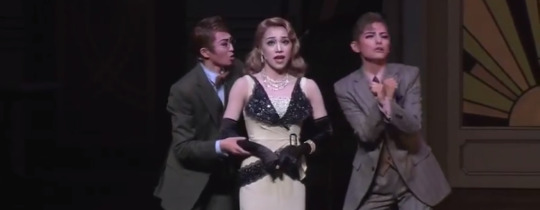
Lily sings a whole song about how that’s never ever ever going to happen, and Bruce freaks out to learn that Oscar is on the train. Lily insists they have no romantic history, and then immediately lights up when she hears Oscar’s voice in her head. They sing a lovey duet representing that they’re still clearly both on each other’s minds. Despite the comedic and not at all tender nature of this show, and the love-hate relationship between these two characters, Daimon and Maaya’s chemistry, in my opinion, has never been better. I wouldn’t have thought it would take playing two self-centered assholes who both despise and desperately want each other to send the sparks flying, but BOY did it do the trick.
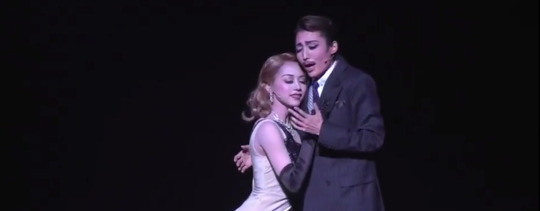
Meanwhile, the REPENT sticker situation is getting worse, and the audience at this point realizes that the culprit is the unassuming little old Letitia Primrose—played brilliantly by Kyou Misa.
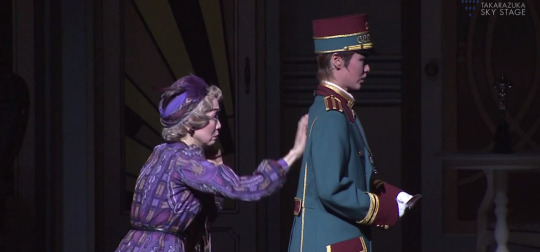
She sings about how she’s taken it as her mission to encourage young people to repent for their sins.
Oscar hears from Owen and Oliver that Lily is with Bruce and is despondent; he declares that he still loves her will definitely steal her back from both him and Hollywood. Oliver is fed up with his nonsense and tells Oscar he’s off his rocker (bless Manaharu and her ability to simultaneously look like a squirrelly little dude in her suit and bowtie and also not only stand up to Daimon but rile her up and get even more out of her). They get into a big fight and as Oliver storms out of the room, Oscar notices a giant REPENT sticker on Oliver’s back and chases after him to remove it. When he removes and reads it, he’s struck with divine inspiration for a new play about Mary Magdalene, a part so good Lily can’t possibly resist it.
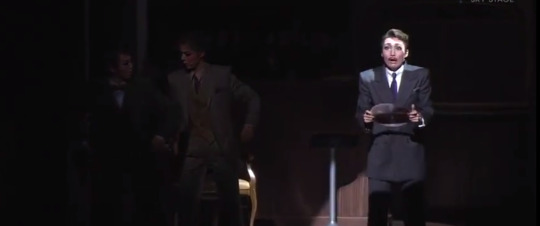
Oscar is so sure this will work he instructs Owen to go buy him a bible so he can start writing the script immediately. Owen reminds Oscar that the train is in fact moving and they can’t really do anything at all, when they see Ms. Primrose’s bible on a chair (and all fall dramatically to the ground). Oscar takes that as a second miracle, insisting this means there will be a third, and Owen and Oliver agree to play along with his demands.
Oscar, now filled with renewed confidence, and Bruce, just as big and dumb as ever, sing a duet about how Lily is theirs (not at each other, separately in their own rooms). Both of them are just awful men.
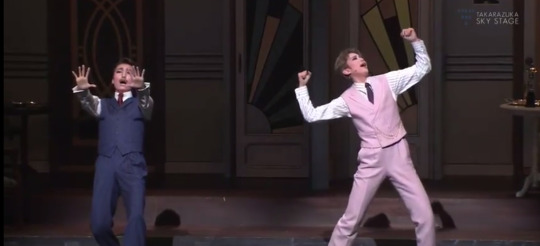
While the two of them are non-confrontationally fighting over the same woman, Owen is in the bar trying to write a press release about the triumphant return of golden duo Oscar Jaffee and Lily Garland. Ms. Primrose picks up a crumpled draft from the floor and muses that she’d love nothing more than to sponsor some big artistic project. That gets Owen’s attention, and she reveals to him that she runs a patent medicine company and doesn’t know what to do with all her money. Owen calls to Oliver that they’ve found their third miracle!
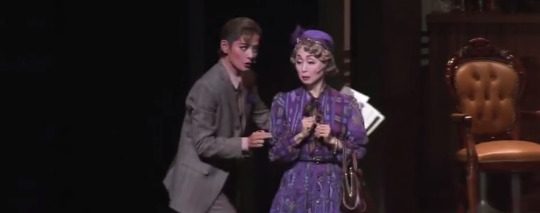
Back in her room, Lily emerges in lime green negligee, to Bruce’s delight. Things are just getting uh sexy I guess when Oscar interrupts them and actually confronts Lily for the first time.
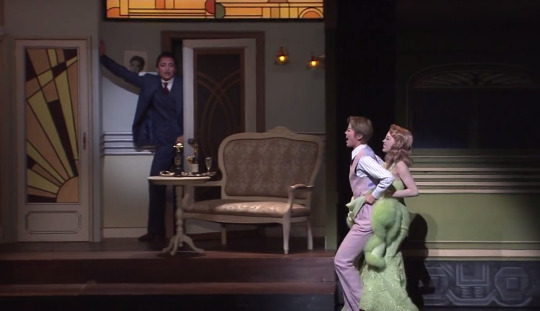
Bruce is furious that Lily lied about her history with Oscar, who is sitting on the couch in back of the room drinking their champagne and eating all the olives out of their martini glass as they argue. Bruce eventually storms off, slapping his headshot onto the wall as he leaves the room (Oscar immediately stands and tears it up). Lily sits down on the couch, now arguing with Oscar and angrily joining him in eating olives. Their hands touch going for the glass at the same time; Lily sternly tells him to let her go but then turns around and caresses her hand happily. Oscar takes this moment to spring his play idea on her; Lily reveals that she heard the whole story of his bankruptcy from Owen and Oliver and tells him she’s on her way to NY to sign with a reliable producer (the formerly useless Max Jacobs who Oscar himself fired). Realizing he’s out of game, Oscar starts hurling insults and they sing another spark-flying duet—Lily insisting she has everything, and Oscar insisting movies are beneath her talents and she’ll rot in Hollywood and fall into obscurity.
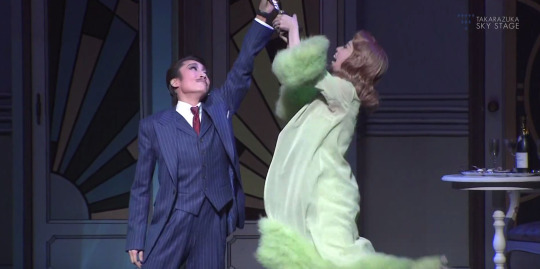
Lily eventually kicks Oscar out, EARNESTLY throwing and smashing a champagne bottle against the door behind him. Oscar, without even taking a breath between Lily’s room and his, screams at his two traitors for ruining his plan and strangles poor Oliver (on senshuuraku Daimon held on for a comically long time, and Manaharu, refusing to concede that ad lib, then played dead on the floor for a good minute). Oliver and Owen save their own asses by telling Oscar about the sponsor they managed to find on board, and THAT’S ACT ONE (right before curtain, we see a tiny little plane labeled “Max Jacobs” flying above the train).
During the big ensemble number (”Life is Like a Train”) that opens act 2 we discover that the train is now absolutely covered in REPENT stickers, then Owen and Oliver take Oscar to meet Ms. Primrose.
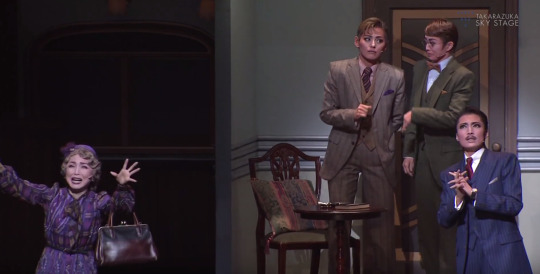
I can’t stress enough how delightful Kyou Misa was, the perfect little ostensibly earnest but just subtly batty old lady; the way she stiffly hobbled around was adorable too. Ms. Primrose is thrilled to work with the great Oscar Jaffee, and even more thrilled to share the story of Mary Magdalene with the world, and asks him how much money he needs. Oscar nervously asks for $20,000, at which Ms. Primrose balks that that CAN’T possibly be enough and writes a check for $200,000. Oscar, Owen, and Oliver giddily sing “Five Zeros” in a manner not unlike Scrooge McDuck swimming in his gold coins, and over the course of the song Ms. Primrose bumps it up to $20,000,000 (in the 1920s!). Now they’re sure they’ll be able to lure Lily back.
Oscar is about to go grab Lily and introduce her to Ms. Primrose when the train doctor Dr. Johnson (Kujou Asu) busts into his room with yet another manuscript (A day in the life of a doctor!). I mention this mostly because a) I LOVE ASU DEEPLY, she is so underused, and b) the three musketeers leverage this manuscript situation later on in my other favorite scene. They get rid of Johnson and Oscar finds that Lily wants to see him also. She sits him down and asks Bruce to give them some time alone (on his way out, he goes to replace his torn head shot with a new one that comically unfolds into five headshots before Oscar violently chases him the rest of the way out the door). Oscar is fuming, and Lily tenderly asks him to sit, which he does with a grumpy face and a flamboyant kick as he reluctantly crosses his legs on the sofa. Lily explains that she’s embarrassed by her behavior so far, is so grateful to Oscar for her career, and wants to help him after all... so she reaches into her bra and pulls out a check for $35 so at least he’s not dead broke. Oscar, amused, stands up and, acting as if he’s a magician, folds up the $35 check and dramatically asks Lily to blow on his hand. Out comes the $20,000,000 check.
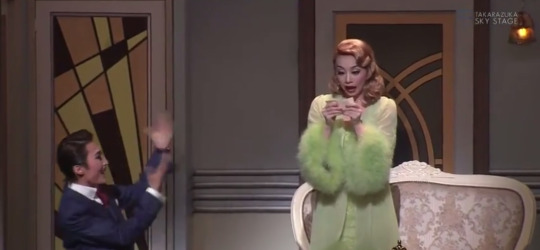
Oscar ushers Lily into his room to prove to her that Ms. Primrose is in fact a real person who wants to sponsor his new play, if she’ll star in it. Lily, despite still generally feeling like she’d rather die than work with Oscar again, is now enticed both by the role of Mary Magdalene, which is much juicier than what she’s been allowed to do on screen, and the prospect of raking in this much money without being beholden to the jerks who run Hollywood. Faithful Oliver has already prepared a contract, and we get “Sign It Lily,” probably both the most difficult/impressive song and biggest earworm of the show. Not the best version but here, have a listen.
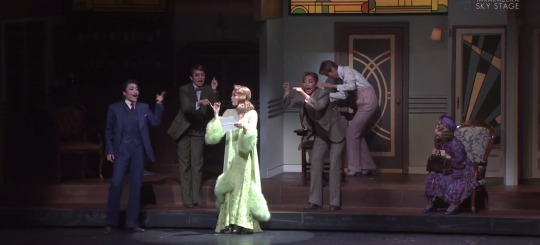
Oscar, Owen, Oliver, and Ms. Primrose are all bombarding Lily trying to get her to put her name on the thing (I truly don’t know when Daimon breathes), while simultaneously trying to keep Bruce and his contrary agenda out of the room (Saki gets repeatedly slammed into doors and walls, closed into closets, suffocated with pillows, etc). Lily gets overwhelmed and runs back to her room, pursued by a cocky triumphant Bruce, who yells behind him that they’ll never get her back away from movies.
Oscar gets a lightbulb moment at the word movie, and the team files one by one back into Lily’s room, smashing Bruce in the head with the door each time. Oscar tells Lily that if she agrees to do the play, he’ll shop the movie rights to whatever studio she wants (to which Ms. Primrose responds WHY BOTHER, she’ll fund the movie too). That pushes her over to yes, and she takes the contract to read carefully. The conductor enters the room notifies everyone that they are approaching Cleveland, and that Ms. Primrose’s nephew and his wife sent a telegram ahead that they’d be boarding the train there to meet her. She turns cold and hurries off alone.
Owen, out for a celebratory entire bottle of wine, coincidentally runs into Ms. Primrose’s nephew (Machi Yuuka), who is frantically searching for his aunt. He says she hasn’t been all there since she stepped down from her position as company president, and just escaped from her mental institution. Owen asks about her money, the nephew says there is none, and Owen realizes they’re fucked.
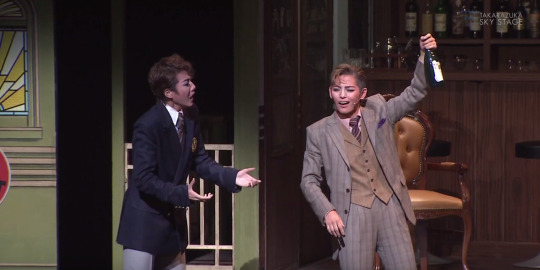
In the frantic search for the missing Ms. Primrose, Bruce overhears Owen breaking the news to Oscar and Oliver, and tells Lily that Oscar deceived her again. She’s furious, and Oscar probably only escapes with his life because just at that exact moment, the formerly useless and fired but currently hot and successful Max Jacobs bursts through the door (Oscar yells MAX JACOBS like he’s going to burst every single blood vessel in his head and neck).
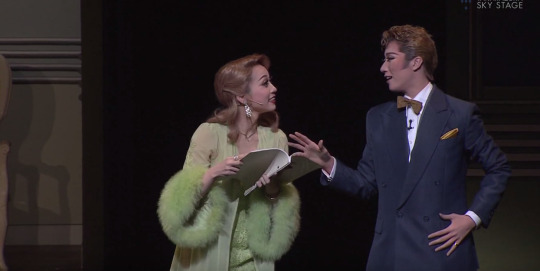
Max hopped a private plane to Cleveland to meet the train, because he has a brand new play written just for Lily (called “Babette”), and he’s so excited he can’t wait for her to get all the way to New York. Babette is a glamorous high society type role about a woman in love with two men. Lily starts reading the script, but finds herself wondering out loud if it can be changed to be more like Oscar’s. Max is incredulous and starts trash talking Oscar, and Lily slaps him REAL HARD in the face. She then catches herself yet again and and asks to be left alone to read the Babette script more carefully.
We’re taken to Lily’s wistful daydream of a classy party taking place in the Babette universe as she tries to wrap her head around the show and imagine herself in the title role. But she finds it dull, and every few pages, she has an intrusive thought about the more inspiring Mary Magdalene—one minute she’s milling through the impeccably dressed party guests, and the next she’s face to face with Owen or Oliver or Ms. Primrose dressed like an Apostle, until finally Oscar dressed as Calaf Jesus crashes the whole thing from behind.

(Yup that’s a screenshot of the bromide sample page).
But Lily brings herself to her senses yet again, drives away all thoughts of Oscar, and agrees to sign with Max.
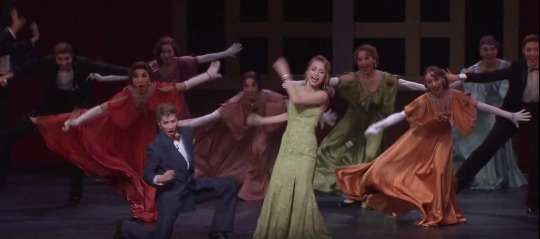
Oscar has lost and he’s despondent. He walks into the train bar to find Oliver sulking behind Owen who is passed out drunk in a chair. He takes out a gun (Oliver tries frantically to wake Owen), and begins a melodramatic monologue about how it’s better just to end his life now because no one wants to see him become a beggar in times square.
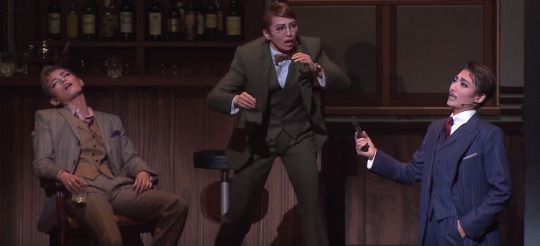
Daimon hilariously mimes Oscar begging, then people throwing garbage at him, then dodging the thrown bits (on senshuuraku Aasa and Manaharu joined in with pretending to throw things). Eventually he leaves the room in despair, and Oliver asks Owen if he thinks boss would really kill himself. Owen is in the middle of saying absolutely no way when they hear a gunshot and run into the next room.
Oscar, now in a comical panic rather than a depression, is clutching his side and gasping that he’s been shot, and the heretofore still missing Ms. Primrose is in the corner of the room holding the gun by her fingertips, crying that she was just trying to put it away when it went off.
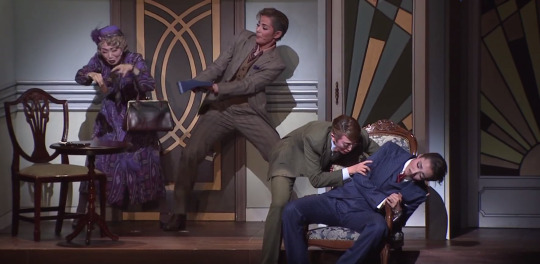
Oliver runs to get Dr. Johnson while Owen tends to Oscar who is (again, comically) writhing in a chair and complaining that being shot by a crazy granny is not how he wanted to go, and this is my second favorite progression of scenes.
Owen offers to call the pastor for Oscar (who, by the way, cannot identify WHERE he has been shot), and Oscar gets mad. Owen then offers him ice cream. Oliver sticks his head back in the door to ask of Oscar is dead yet. Owen says not yet and brings in Dr. Johnson (Asu, my love) who at first giggles and assumes that because it’s Mr. Jaffee he’s just acting. Owen and Oliver assure him this is real, and begin moaning and wailing as Dr. Johnson examines Oscar in earnest.
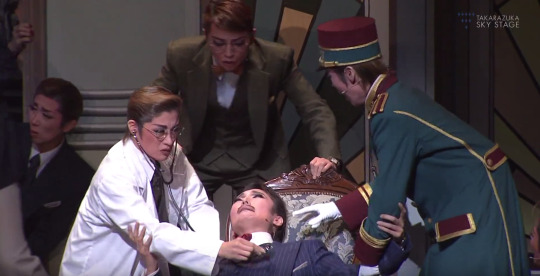
He stands up, and Owen and Oliver take this to mean it’s a hopeless case, and it’s time for them to say goodbye. On senshuuraku, Daimon verrrrrrrrry slowly slid all the way down the chair, so that Aasa had to hold her up by the arms to keep her from wiping out, AND had to kick her foot to a lower step of the stage so she could stand up again. The raku digest thankfully shows a bit of this, along with the Matrix move Daimon had to pull to jump to her feet when Dr. Johnson declares that Oscar hasn’t been shot at all.
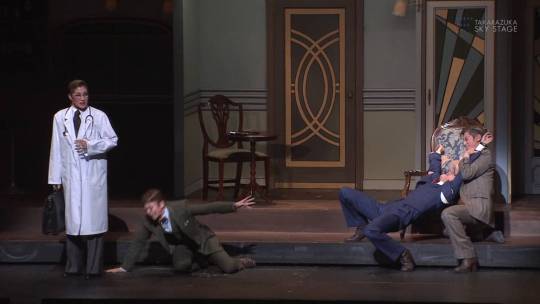
(It does not, however, convey how drawn out and hilarious this was, nor does it show the chair then toppling onto poor Aasa, and it taking her at least 3 tries to get it off her again).
Oscar then gets another harebrained idea, and tells Dr. Johnson that he read his manuscript from before and that it’s SO GOOD he wants to give him an acting lesson right then and there. Dr. Johnson is stoked. Oscar tells him to just sit in the chair, stare at him solemnly, and shake his head back and forth if anyone looks at him (Asu, over the next few minutes, gives what my admittedly biased heart firmly believes is the award winning performance of the show). Oliver and Owen are to pretend Oscar is dying. The cherry on top of senshuuraku was in the moment before this all commenced, Daimon, immediately after the chair debacle, took an extra long pause before delivering (completely straight-faced) her usual line of “I don’t want to see any hammy acting,” after which the others took a comically long pause before replying, “Yep.”
Dr. Johnson takes his place in the formerly toppled chair, Oscar grabs a pillow and lays down on the floor, Oliver and Owen go fetch Lily and start wailing again. Agnes and Bruce also follow Lily into the room and start crying themselves at the sight of Oscar “dying” on the floor. Dr. Johnson looks around from person to person in a panic and starts hyperventilating. Owen and Oliver mime at him to look sadder, Asu licks her finger and dabs tears on her cheeks and then makes the dumbest crying face I’ve ever seen, shaking her head increasingly aggressively each time someone in the room looks at her. Daimon and Maaya are weepily singing “Lilyyyyyyyy, Oscaaaaarrrr” back and forth for deadass three entire minutes. I can’t believe how much vocal control Daimon has even lying on her back on the damn floor.
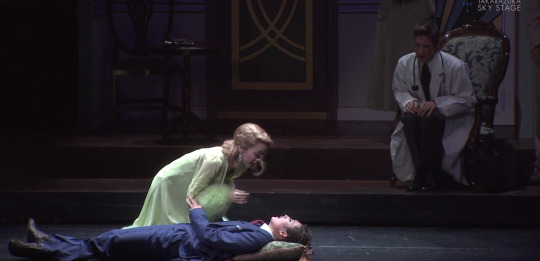
Lily eventually signs the contract as Oscar’s dying wish. When Max enters the room, Oscar immediately jumps up to rub it in his face, and Lily once again is furious at being deceived. Oscar claims that with no money to offer, the only way he could rescue her from a rotted career was through trickery. **I FORGOT BECAUSE I FINISHED THIS AT 6AM AFTER BEING UP ALL NIGHT that Lily gets the last word because she hasn’t actually signed her name at all but written PETER RABBIT. They throw things and hurl vicious insults at each other and then finally realize they’re just too hot for each other after all and throw open their arms and get married.
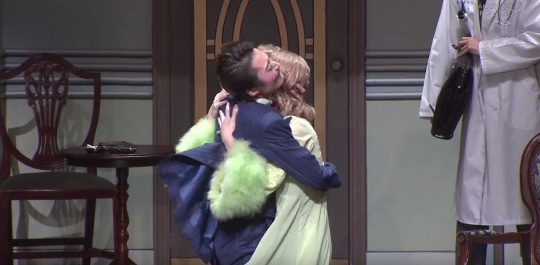
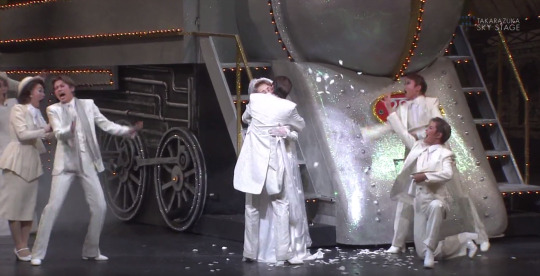
The finale opened with Agata in a top hat and tails dancing with a stick and a bunch of musumeyaku, then there was a huge golden group tap number and a lovely waltz for the duet dance.
I’ve been pretty upset that I had to miss BeruBara 45 and that I booked the trip I’m currently on before finding out Komu and Wataru would be returning to Bow Hall this summer, but being able to see this, especially since we’ll never see it again, was so so worth it. It was certainly a much needed boost for me personally, and it seems like it was a boost for the troupe and for Daimon and Maaya as a combi as well. I’m always torn about Broadway shows like this, because they’re SO good, and I WANT them to take on these kinds of challenges, especially when the result is so spectacular, but it’s such a bummer when they disappear forever. Many points to Harada for fitting this weird musical to Yukigumi like a perfect cozy little glove.
#takarazuka#reviews#on the 20th century#actual longest review ever#I didn't proofread it#I don't even want to read it#am i 東宝組 now 19
78 notes
·
View notes
Text
Tachanka/Vigil oneshot in which horrible, horrible things happen. (Rating M/E, angst and some gore, ~2.5k words) - written for @zer0kaji because it’s your birthday, my dear 💞💞 I didn’t ask you for a prompt so I hope this is alright! Happy birthday 💗
.
His heartbeat is deafening, the blood roaring in his ears muffling all sounds around him: the wet squelches of his soles hitting the mud, his laboured breaths, the rustling of the undergrowth through which he’s bursting; the footsteps following him, entirely too fast for how degraded the muscles must be.
Every single step is agony, his injured leg pulsing and throbbing, sending a sharp twang of pain through his body whenever he sets his foot down yet ignoring the ache is remarkably easy considering his life is on the line and dependent on him reaching the wooden hut he saw in the distance, a weak promise of temporary shelter and refuge. He doesn’t dare hope but maybe there’s weapons inside, a first aid kit, anything to ensure his survival.
Because if not, he’ll be stuck. And they’ll catch up to him.
Never before has any noise been as sweet as the slam of the door behind him, as the reassuring click of the deadbolt. It might’ve been a hunter’s hut, but whatever it was it’s been vacated, empty shelves greeting him, barren drawers gaping with their doors open, mocking his plight and refusing to offer any assistance. Even so, he’s grateful for the brief reprieve and considers collapsing right then and there, his brain struggling to process any of what happened – nightmarish images begin flooding his mind before he can stop himself and he’s threatening to spiral, allow a crash from which he won’t be able to recover.
When a body collides with the door loudly, he jumps. For now, it holds, but the noise is followed by a something not quite a knock, a meaty thumping against the solid wood, too arrhythmic to be human and the volume speaking of a complete lack of care for the creature’s own well-being. Its eerie quality freezes his heart and makes his fingertips twitch, triggering his fight response seeing as he attempted flight previously – and unsuccessfully. After more than a minute, it finally stops. Maybe the monstrosity got bored. Maybe it’ll wander off.
He allows himself a silent, deep breath. Then he notices one of the windows not being hammered shut.
.
Vigil has always been self-reliant. Not the kind who strive to be aggressively independent, reject authority or set out to follow their dreams, but the kind who are satisfied with themselves as company. Who prefer not asking for help and instead master obstacles through their own resourcefulness. Who don’t demand or expect much, the ones who seek perfection yet settle when they realise it’s unattainable. Accepting Blackbeard’s advice, confiding in him, even trusting him to a certain degree was painfully difficult, required compromises and understanding on both sides, took an embarrassing amount of time. But at least it paved the way for the second friendship he developed in Rainbow.
Oddly enough, Tachanka is quiet in his presence. Among his countrymen, he boasts and admonishes, teases and lets out hearty laughs which shake the walls, even with some of the other operators, the old Russian is jovial and easygoing. His booming voice often dominates the cacophony of a crowded room and wherever he walks, his colleagues step aside. When he was younger, Vigil read an ancient Western comic featuring a knight respected and revered, battle-weary yet full of hope regardless, having earned awe as well as camaraderie. He sees the same spirit in pale blue eyes.
And yet he’s muted around Vigil, dulled, almost as if he was walking on eggshells and it irritates him. He’s used to similar treatment, used to being ignored, mocked or dragged into conversations against his will, he’s experienced it all and come up with proper responses, but somehow Tachanka’s silence bothers him to a worrying extent. So he talks to him. Pokes and prods out of spite, prickly comments followed by inflammatory questions, his temper seeping through the seams carefully holding him together. He never accuses him of anything outright but tests him nonetheless, scouring his replies for racism, pity, dismay, anything to explain the Russian’s change of demeanour around him. He comes up empty.
Not quite empty, though. There is something. Between his suspicious inquiries and Tachanka’s vaguely bemused responses, they become accustomed to each other. After a long period of being watched warily by their colleagues, they finally figure out how to angle themselves so they snap together, like puzzle pieces who don’t quite fit but are good enough and then Tachanka is asking him for help in navigating an unfamiliar website and Vigil is describing Korean cuisine to him. The incessant river of Vigil’s undivided attention and determined prodding eventually eroded a canyon comprised of forgetting the time during a long conversation, bringing up uncomfortably private topics, friendly silences and encouraging smiles exchanged across the room; a canyon not permitting him any other alternative but to keep floating towards Tachanka, hovering in his orbit and breathing more easily in his presence.
He’s surprisingly gentle.
When Vigil eventually asks about his early quietness, the Russian tells him that he was under the impression Vigil preferred silence over forced conversation – which isn’t wrong. In retrospect, he seems amused to learn how much his considerate behaviour got under Vigil’s skin, and a while later, in a whisper, he admits that Vigil was the only one with whom he didn’t feel the need to prove himself.
He’s gentle. And Vigil stretches towards his affection like a needy kitten.
.
The pane explodes inwards. Instinctively turning away from the shards raining on him, he catches sight of a sturdy-looking wardrobe possibly robust enough to block the new entrance into his hideout. Shaking crystalline glass out of his hair, he realises there’s something else to be taken care of first, something too grotesque and bone-chilling to describe further, something on which his eyes refuse to focus, instead gracing him only with a blurred mass of decaying flesh, pus, blood and other bodily fluids, stiff limbs. Not human. He has to repeat it to himself, over and over, chastising himself for the paradoxical notion that the creatures having lost all of their humanity somehow makes it harder to dispose of them.
He’s… gotten rid of quite a few before, so it’s done with the mechanical efficiency of someone who’s become numb to the horrors of reality – a numbness accompanied by an alarming lack of emotions. They’re a luxury he can ill afford right now. A table leg buries itself into a nauseatingly soft torso, the body giving in willingly yet retaliating with a truly sickening stench emanating from pierced internal organs. Momentarily incapacitated, hand-like claws curiously ghost over the foreign object impaled in rotten skin and allow him enough time to break off another makeshift club with which he dispatches of the abomination.
Pride flares up at him when he manages to push the closet in front of the crimson-spattered windowsill before violently vomiting into a corner. He’s seen worse, he tries to convince himself, has lost people closer to him, has experienced similar tragedies. He’s seen worse, he keeps repeating, yet another one of his mantras aimed at retaining his sanity, but then he remembers and retches again, the harsh bite of his own stomach acid burning all the way.
Shrill shrieks of terror ring in his ears and once more, he’s cursed to helplessly watch as Dokkaebi is torn apart alive, fallen to the wolves and struggling with all her might, eyes wide and futilely jerking away when teeth pierce the skin of her throat. A hand wrapped around his wrist and pulled him away from the mesmerising view, simultaneously real and impossible, the contradiction paralysing him whole. She used to yell at him when he folded the clothes she left lying around. She used to nudge him with an elbow during their conversations now and then, the physical contact bemoaned yet secretly welcomed as a sign of friendliness. She was a person with a past and a future, now reduced to – to nothing, the sum of her parts infinitely more meaningful than this, than bloody pieces scattered -
His cheeks are wet. Whether it’s the overwhelming grief, the sheer exertion or his pulsing leg, he doesn’t know. He notices red on his fingers, belatedly pulls out a transparent shard without even grimacing and can’t find the capacity to fall into a panic about mixing his blood with that of the lifeless monster outside.
When he settles by the wardrobe, wipes away moisture with a sleeve, he hears them coming. A straggler caught sight of him during his escape, now nothing more than insect fodder outside, but the small group chasing him seems to have tracked his scent to his current location. They, too, smash against the door, dumbly yet without holding back.
Vigil begins considering the possibility that he might not leave the small house alive. This time, he doesn’t bother drying his tears.
.
Tachanka is invincible.
With some of the other operators, Vigil feels his protective instincts kick in, the wish awaken to help and support and grant much-needed salvation or rest, but the Russian is immune, impervious, invulnerable. Whatever happens in his life, he picks himself up and carries on either stoically or with a humorous remark on his lips. He remains unfazed in the face of abject horror and keeps his cool, always stays, always answers. His reliability tricks Vigil into relinquishing some of his own, persuades him to lean against this bear of a man, allow himself to relax. To trust.
It’s new, the entire experience is breathtaking and strangely exciting as if he was doing an extreme sport instead of accepting someone into his personal space and he begins carrying a sun in his heart, glows from the inside and radiates warmth. He never thought an accent-laden voice, heavy with memories, could bring him such peace, never considered a gruff yet kind man could calm the stormy seas inside him.
So when he hears Tachanka’s words waver, watches his face pale, feels his hands shake, an unparalleled terror takes up residence in his chest – because if the boulder is in fear, the pebble is doomed.
The list of things which went wrong is troubling, the events leading to their team being stranded and confronted with the unthinkable a blur in Vigil’s memory. His mind refuses to remember which part was his fault, which part anyone else’s, whether fate itself decided their path.
Mute was the first to go, hammering home the reality of it all, the omnipresent danger, and leaving them all shaken, lost, mourning. Even Tachanka.
A day after Dokkaebi – a day after, Vigil sees it. Knows Buck isn’t aware because as distressed as the Canadian is, he hasn’t lost his sense of practicality and would indubitably have brought it up, possibly to a vote, pleading and reasoning with the last two of his companions. Calling for a decision Vigil is unable to make, unable to fathom in the first place, the idea so vague and yet so atrocious in his head he casts it out immediately. He keeps quiet about the teeth marks, doesn’t speak up when Tachanka wraps himself in bandages claiming a harmless injury, mentions nothing when they seek solace in each other.
He can’t. Because allowing for it to leave his tongue would call for consequences too cutting to be worth it. So he stays mute, clings and suppresses his thoughts.
This is on him. He knows it with unshakeable clarity the moment he returns to their makeshift camp, hears the vile, wet noises, the cracking of bones and muffled snarling, the moment he catches sight of Buck’s torn uniform, of all the bright, viscous red. Of pale blue eyes sliding over to him, sated for the moment, chewing with his mouth open, yet the hunger behind the irises is unmistakeable.
It’s on him. Vigil knows it. Refuses to shift any of the blame, despite the fact neither of them spoke up – but he wasn’t the one affected, not the one in mortal danger, terrified and without a way out. He should’ve made a decision but as always, he remained quiet.
.
Now Vigil is sitting here, waiting for inspiration to strike. Communications are dead, have been for a worrying amount of time. For days, he’s been doing nothing but running, always running, memories of his childhood plaguing him, unbidden as they are relevant. They fuse together with reality, at times his mother whispers into his ear, his father holds his hand and drags him forwards, like Tachanka, both of them urging him to move on, grieve later, concentrate on surviving. He was tired then and is utterly exhausted now.
Outside, they’re testing the walls for weakspots, skulls smashing against the boards covering the windows, fingers scratching themselves bloody on the façade. It’s a matter of time, probably, but for the moment he should rest, gather energy, then come up with a plan to escape – the furniture must have nails, maybe he can…
A loud crack makes his eyes flit over to the window next to him, bright sunshine blinding him momentarily and his brain struggles to process that one of the monsters outside must’ve ripped off one of the planks. They might be fast yet usually they lack intelligence, choosing instead to brute force their way to their next meal. This one must be -
Slowly, a shadow pushes itself in front of the newly-made hole, blotting out the sun. It’s a face, putrid and decayed, the flesh sagging and exposing bone in some places, the one eye looking around with disturbing alertness bloodshot. And pale blue.
Vigil’s breathing calms. As always, peace spreads inside him, though this time it’s borne of another source, arises with a different quality. Now he knows he won’t make it out because he – it – he is invincible, impervious, invulnerable. He’ll track him down. So there’s only one alternative left.
He still has his belt. It was practical in that he lost weight quickly and needed it; now it’s invaluable. They used up all their ammunition and he left his knife behind in a slain body. There’s a wooden beam spanning across the room and the previous occupant helpfully left behind a chair for him to use, so if he’s quick enough, he won’t even feel the first nibble. He’s overcome with the sudden and entirely inappropriate urge to laugh while pulling the leather out of his belt loops, but the notion disappears quickly when hands reach inside and start pulling on the next board.
“I’m sorry”, he hears himself say as he gets up, voice unsteady. “I’m so sorry.”
Vigil hopes fiercely there’s no more after he’s done, that he’ll be embraced by eternal darkness instead of being sent somewhere else and potentially reuniting with the ones he loved. He hopes desperately, desperately that there’s nothing afterwards. Because he doesn’t think he’d be forgiven, least of all by himself.
#rainbow six siege#tachanka#vigil#tachanka/vigil#fanfic#oneshot#I'm back!!#and I'm sorry it's with something as horrifying as this#but it was surprisingly fun to write#please don't read if this isn't your thing!!#I hope you like it kaji :)
45 notes
·
View notes
Text
An Analysis to Joseph Conrad’s “Heart of Darkness”
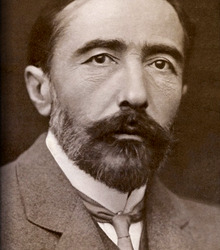
About the Author
Joseph Conrad, original name Józef Teodor Konrad Korzeniowski, (born December 3, 1857, Berdichev, Ukraine, Russian Empire [now Berdychiv, Ukraine]—died August 3, 1924, Canterbury, Kent, England), English novelist and short-story writer of Polish descent, whose works include the novels Lord Jim (1900), Nostromo (1904), and The Secret Agent (1907) and the short story “Heart of Darkness” (1902). During his lifetime Conrad was admired for the richness of his prose and his renderings of dangerous life at sea and in exotic places. But his initial reputation as a masterful teller of colorful adventures of the sea masked his fascination with the individual when faced with nature’s invariable unconcern, man’s frequent malevolence, and his inner battles with good and evil. To Conrad, the sea meant above all the tragedy of loneliness. A writer of complex skill and striking insight, but above all of an intensely personal vision, he has been increasingly regarded as one of the greatest English novelists.
Source: https://www.britannica.com/biography/Joseph-Conrad
Synopsis
Heart of Dark is written by a Russian author named Joseph Conrad in 1902. Like any of his literary works, the novel is complex that there are a lot of implication imbedded. The novel is about a sailor named Marlow who is a young man trying to explore the Congo jungle in Africa. Along in his exploration, he encountered Africans who are already dead because of being enslaved by the whites. In course of the novel, Marlow narrates how he meets people in the boat he is sailing with including the bricksman, the helmsman who saved his life (during the attack to his boat), the manager who has dark motives, the chief account the Russian and the most remarkable character mentioned in the novel is Kurtz who came to Africa for a noble cost to enlighten the Africans that is why the African. At the end of the story this Kurtz died due to illness and it is Marlow who gave the message to the Intended of Kurtz with a lie.
Analysis
The novel has implicated many different issues that Comparatists have in their claims. The analysis of this novel might be that complex but Joseph Conrad (if you are going to read his book), has dealt with many issues that are directly embedded by different authors in comparative literature.
A. The African workers as Subalterns
How can you say that a person is a Subaltern? A person can be considered as Subaltern because he/she belongs in a low state of living just like being as slave. This theme is repeatedly discussed especially in written and literary in post colonialism. Spivak who wrote ‘Can the Subaltern Speak’ talks about subalternity as a voice that can never speak meaning, if a slave is a slave then he/she is forever a slave and has no right to defend himself.
Africans who were dying because of the excessive work
“They were dying slowly—it was very clear. They were not enemies, they were not criminals, they were nothing earthly now—nothing but black shadows of disease and starvation, lying confusedly in the greenish gloom. Brought from all the recesses of the coast in all the legality of time contracts, lost in uncongenial surroundings, fed on unfamiliar food, they sickened, became inefficient, and were then allowed to crawl away and rest. These moribund shapes were free as air—and nearly as thin. I began to distinguish the gleam of the eyes under the trees. Then, glancing down, I saw a face near my hand. The black bones reclined at full length with one shoulder against the tree, and slowly the eyelids rose and the sunken eyes looked up at me, enormous and vacant, a kind of blind, white flicker in the depths of the orbs, which died out slowly. (Chapter 1). This was when he steps down into a gloomy grove. Here in, it is evident that Africans are dying because of excessive work, some of died and the ones who are alive a suffering because of the excessive demands of the whites to make them work.
“To the left a clump of trees made a shady spot, where dark things seemed to stir feebly. I blinked, the path was steep. A horn tooted to the right, and I saw the black people run. A heavy and dull detonation shook the ground, a puff of smoke came out of the cliff, and that was all. No change appeared on the face of the rock. They were building a railway. The cliff was not in the way or anything; but this objectless blasting was all the work going on.” These lines illustrate how these black men work for the whites.
What is ironic in this novel is that, Africans have been subjected to slavery because of the promise of civilization. However, they being the slaves were being abused which is far from the goal that the whites are ironically aiming.
B. Kurtz appears to support all the liberal ideals which exposed the Africans’ desire to resist.
As a result, because of the excessive slavery, there is part in the story or later in the story that it is illustrating the Africans trying to resist from that of slavery. That is why Kurtz appeared to be admirable in the eyes of those who are with Marlow but at the end he is not because it is him who headed the attack to Marlow’s group which killed Marlow’s African helmsman. ‘Evidently the appetite for more ivory had got the better of the—what shall I say?—less material aspirations. However he had got much worse suddenly. 'I heard he was lying helpless, and so I came up—took my chance,' said the Russian. 'Oh, he is bad, very bad.' I directed my glass to the house.’
The act of such support is because of the African’s resistance to how they are being treated by the whites. This is related with Fanon’s claim in his essay on how the colonized are trying to decolonize themselves. There is this idea of refusing to the submission of the colonization. According to France Fanon, people who are colonize are trying to regain their cultural identity and to regain liberation and freedom is finding national consciousness. This is the reason why Africans are being convinced by Kurtz because they thought, Kurtz is their key to be freed, yet is the reason of the death of most of them because in the end, for power and profit, Kurtz killed the Africans.
“It appears these niggers do bury the tusks sometimes—but evidently they couldn't bury this parcel deep enough to save the gifted Mr. Kurtz from his fate. We filled the steamboat with it, and had to pile a lot on the deck. Thus he could see and enjoy as long as he could see, because the appreciation of this favour had remained with him to the last. You should have heard him say, 'My ivory.' Oh, yes, I heard him. 'My Intended, my ivory, my station, my river, my—' everything belonged to him.”. These lines are evidences of Kurtz cruelty. However, it can be seen here how these blacks try to save him from that trouble of death.
A. Hybridity as reflected to white having companions who are blacks
The concept of hybridity is first claimed by Homi Bhaba in his essay Remembering Fanon. This has something to do with the idea of ‘third space’ of enunciation which means that there is in between which results to the mixture. And in this novel hybridity is evident in the following:
The helmsman is a black educated by the ancestors of Marlow
“An athletic black belonging to some coast tribe and educated by my poor predecessor, was the helmsman. He sported a pair of brass earrings, wore a blue cloth wrapper from the waist to the ankles, and thought all the world of himself. He was the most unstable kind of fool I had ever seen. He steered with no end of a swagger while you were by; but if he lost sight of you, he became instantly the prey of an abject funk, and would let that cripple of a steamboat get the upper hand of him in a minute” (Chapter II). As evident in this lines, the hybrid helmsman who has adopted the way of living of the white is being illustrated here. And in the later part of the story, as this helmsman died, Marlow has this guilt in him because he thrown the body of this man for he is afraid that cannibal might eat his body.
In their journey to that unexplored African jungle, with the whites are the black men who have been serving them.
As I have read this novel, though ideas are clear but because of some implications, there are times that I got confused of the character of Marlow. But here, heart of darkness talks about the perspective of the characters towards each other and towards the blacks. As I have observed this novel has exaggerated the motives of the characters such as Kurtz whose motives are dark for Africans are exposed and Marlow’s perspective towards the black Africans that he even doesn’t want them to hear talking.
1 note
·
View note
Text
Jeremy Corbyn speech at Chatham House
Jeremy Corbyn, Leader of the Labour Party, speaking at Chatham House, said:
***Check against delivery***
Chatham House has been at the forefront of thinking on Britain’s role in the world. So with the General Election less than a month away, it’s a great place to set out my approach: on how a Labour Government I lead will keep Britain safe, reshape relationships with partners around the world, work to strengthen the United Nations and respond to the global challenges we face in the 21st century.
And I should say a warm welcome to the UN Special Representative in Somalia, Michael Keating, who is here today.
On Monday, we commemorated VE Day, the anniversary of the victory over Nazi Germany in Europe.
VE Day marked the defeat of fascism and the beginning of the end of a global war that claimed seventy million lives.
General Eisenhower, supreme commander of the Allied forces in 1944, went on to become Republican President of the United States during some of the most dangerous years of the Cold War in the 1950s.
In his final televised address to the American people as President, Eisenhower gave a stark warning of what he described as “the acquisition of unwarranted influence by the military-industrial complex.”
“Only an alert and knowledgeable citizenry”, he said, “can compel the proper meshing of the huge industrial and military machinery of defence with our peaceful methods and goals, so that security and liberty may prosper together.”
Sadly, in the more than half a century since that speech, I think it’s clear that Eisenhower’s warning has not been heeded.
Too much of our debate about defence and security is one dimensional. You are either for or against what is presented as “strong defence”, regardless of the actual record of what that has meant in practice.
Alert citizens or political leaders who advocate other routes to security are dismissed or treated as unreliable.
My own political views were shaped by the horrors of war and the threat of a nuclear holocaust. My parents met while organising solidarity with the elected government of Spain against Franco’s fascists during the Spanish civil war.
My generation grew up under the shadow of the cold war. On television, through the 1960s and into the seventies, the news was dominated by Vietnam. I was haunted by images of civilians fleeing chemical weapons used by the United States.
I didn’t imagine then that nearly fifty years later we would see chemical weapons still being used against innocent civilians. What an abject failure. How is it that history keeps repeating itself?
At the end of the cold war, when the Berlin Wall came down we were told it was the end of history. Global leaders promised a more peaceful, stable world.
It didn’t work out like that.
Today the world is more unstable than even at the height of the cold war. The approach to international security we have been using since the 1990s has simply not worked.
Regime change wars in Afghanistan Iraq, Libya, and Syria – and Western interventions in Afghanistan, Somalia and Yemen - have failed in their own terms, and made the world a more dangerous place.
This is the fourth General Election in a row to be held while Britain is at war and our armed forces are in action in the Middle East and beyond.
The fact is that the ‘war on terror’ which has driven these interventions has failed.
They have not increased our security at home – just the opposite.
And they have caused destabilisation and devastation abroad.
Last September, the Commons Foreign Affairs Select Committee published a report on David Cameron’s Libyan war.
They concluded the intervention led to political and economic collapse, humanitarian and migrant crises and fuelled the rise of Isis in Africa and across the Middle East.
Is that really the way to deliver security to the British people?
Who seriously believes that’s what real strength looks like?
We need to step back and have some fresh thinking.
The world faces huge problems. As well as the legacy of regime change wars, there is a dangerous cocktail of ethnic conflicts, of food insecurity, water scarcity, the emerging effects of climate change.
Add to that mix a grotesque and growing level of inequality in which just eight billionaires own the same wealth as the 3.6 billion poorest people.
And you end up with a refugee crisis of epic proportions affecting every continent in the world. With more displaced people in the world than since the Second World War.
These problems are getting worse and fuelling threats and instability.
The global situation is becoming more dangerous.
And the new US President seems determined to add to the dangers by recklessly escalating the confrontation with North Korea, unilaterally launching missile strikes on Syria, opposing President Obama’s nuclear arms deal with Iran and backing a new nuclear arms race.
A Labour Government will want a strong and friendly relationship with the United States. But we will not be afraid to speak our mind.
The US is the strongest military power on the planet by a very long way. It has a special responsibility to use its power with care and to support international efforts to resolve conflicts collectively and peacefully.
Waiting to see which way the wind blows in Washington isn’t strong leadership. And pandering to an erratic Trump administration will not deliver stability.
When Theresa May addressed a Republican Party conference in Philadelphia in January she spoke in alarmist terms about the rise of China and India and of the danger of the West being eclipsed.
She said America and Britain had to ‘stand strong’ together and use their military might to protect their interests.
This is the sort of language that led to calamity in Iraq and Libya and all the other disastrous wars that stole the post-Cold War promise of a new world order.
I do not see India and China in those terms. Nor do I think the vast majority of Americans or British people want the boots of their young men and women on the ground in Syria fighting a war that would escalate the suffering and slaughter even further.
Britain deserves better than simply outsourcing our country’s security and prosperity to the whims of the Trump White House.
So no more hand holding with Donald Trump.
A Labour Government will conduct a robust and independent foreign policy - made in Britain.
A Labour Government would seek to work for peace and security with all the other permanent members of the United Nations security council – the US, China, Russia and France.
And with other countries with a major role to play such as India, South Africa, Brazil and Germany.
The ‘bomb first, talk later’ approach to security has failed. To persist with it, as the Conservative Government has made clear it is determined to do, is a recipe for increasing, not reducing, threats and insecurity.
I am often asked if as prime minister I would order the use of nuclear weapons.
It’s an extraordinary question when you think about it – would you order the indiscriminate killing of millions of people? Would you risk such extensive contamination of the planet that no life could exist across large parts of the world?
If circumstances arose where that was a real option, it would represent complete and cataclysmic failure. It would mean world leaders had already triggered a spiral of catastrophe for humankind.
Labour is committed actively to pursue disarmament under the Nuclear Non-Proliferation Treaty and we are committed to no first use of nuclear weapons.
But let me make this absolutely clear.
If elected prime minister, I will do everything necessary to protect the safety and security of our people and our country.
That would be my first duty.
And to achieve it, I know I will have to work with other countries to solve problems, defuse tensions and build collective security.
The best defence for Britain is a government actively engaged in seeking peaceful solutions to the world’s problems.
But I am not a pacifist.
I accept that military action, under international law and as a genuine last resort, is in some circumstances necessary.
But that is very far from the kind of unilateral wars and interventions that have almost become routine in recent times.
I will not take lectures on security or humanitarian action from a Conservative Party that stood by in the 1980s – refusing even to impose sanctions - while children on the streets of Soweto were being shot dead in the streets, or which has backed every move to put our armed forces in harm’s way regardless of the impact on our people’s security.
Once again, in this election, it’s become clear that a vote for Theresa May could be a vote to escalate the war in Syria, risking military confrontation with Russia, adding to the suffering of the Syrian people and increasing global insecurity.
When you see children suffering in war, it is only natural to want to do something.
But the last thing we need is more of the same failed recipe that has served us so badly and the people of the region so calamitously.
Labour will stand up for the people of Syria. We will press for war crimes to be properly investigated. And we will work tirelessly to make the Geneva talks work.
Every action that is taken over Syria must be judged by whether it helps to bring an end to the tragedy of the Syrian war or does the opposite.
Even if ISIS is defeated militarily, the conflict will not end until there is a negotiated settlement involving all the main parties, including the regional and international powers and an inclusive government in Iraq.
All wars and conflicts eventually are brought to an end by political means.
So Labour would adopt a new approach. We will not step back from our responsibilities.
But our focus will be on strengthening international co-operation and supporting the efforts of the United Nations to resolve conflicts.
A Labour Government will respect international law and oppose lawlessness and unilateralism in international relations. We believe human rights and social justice should drive our foreign policy.
In 1968, Harold Wilson’s Labour Government signed the Nuclear Non-Proliferation Treaty.
As prime minister, I hope to build on that achievement.
Labour’s support for the renewal of the Trident submarine system does not preclude working for meaningful, multilateral steps to achieve reductions in nuclear arsenals.
A Labour Government will pursue a triple commitment to the interlocking foreign policy instruments of: defence, development and diplomacy.
For all their bluster, the Tory record on defence and security has been one of incompetence and failure.
They have balanced the books on the backs of servicemen and women.
Deep cuts have seen the Army reduced to its smallest size since the Napoleonic wars.
From stagnant pay and worsening conditions, to poor housing.
The morale of our service personnel and veterans is at rock bottom.
And as the security threats and challenges we face are not bound by geographic borders it is vital that as Britain leaves the EU, we maintain a close relationship with our European partners alongside our commitment to NATO and spending at least 2 per cent on defence.
That means working with our allies to ensure peace and security in Europe. We will work to halt the drift to confrontation with Russia and the escalation of military deployments across the continent.
There is no need whatever to weaken our opposition to Russia’s human rights abuses at home or abroad to understand the necessity of winding down tensions on the Russia-Nato border and supporting dialogue to reduce the risk of international conflict.
We will back a new conference on security and cooperation in Europe and seek to defuse the crisis in Ukraine through implementation of the Minsk agreements.
We will continue to work with the EU on operational missions to promote and support global and regional security.
This means our Armed Forces will have the necessary capabilities to fulfil the full range of obligations ensuring they are versatile and able to participate in rapid stabilisation, disaster relief, UN peacekeeping and conflict resolution activities.
Because security is not only about direct military defence, it’s about conflict resolution and prevention, underpinned by strong diplomacy.
So the next Labour Government will invest in the UK’s diplomatic networks and consular services.
We will seek to rebuild some of the key capabilities and services that have been lost as a result of Conservative cuts in recent years.
Finally, while Theresa May seeks to build a coalition of risk and insecurity with Donald Trump, a Labour Government will refocus Britain’s influence towards cooperation, peaceful settlements and social justice.
The life chances, security and prosperity of our citizens are dependent on a stable international environment.
We will strengthen our commitment to the UN. But we are well aware of its shortcomings, particularly in the light of repeated abuses of the veto power in the UN Security Council.
So we will work with allies and partners from around the world to build support for UN reform in order to make its institutions more effective and responsive.
And as a permanent member of the Security Council we will provide a lead by respecting the authority of International Law.
To lead this work, Labour has created a Minister for Peace who will work across the Ministry of Defence and the Foreign and Commonwealth Office.
We will reclaim Britain’s leading role in tackling climate change, working hard to preserve the Paris Agreement and deliver on international commitments to reduce carbon emissions.
Labour will re-examine the arms export licensing regulations to ensure that all British arms exports are consistent with our legal and moral obligations.
This means refusing to grant export licences for arms when there is a clear risk that they will be used to commit serious violations of international humanitarian law.
Weapons supplied to Saudi Arabia, when the evidence of grave breaches of humanitarian law in Yemen is overwhelming, must be halted immediately.
I see it as the next Labour’s Government task, as my task, to make the case for Britain to advance a security and foreign policy with integrity and human rights at its core.
So there is a clear choice at this election.
Between continuing with the failed policy of continual and devastating military interventions, that have intensified conflicts and increased the terrorist threat.
Or being willing to step back, learn the lessons of the past and find new ways to solve and prevent conflicts.
As Dwight Eisenhower said on another occasion:
If people “can develop weapons that are so terrifying as to make the thought of global war almost a sentence for suicide, you would think that man's intelligence would include also his ability to find a peaceful solution.”
And in the words of Martin Luther King “The chain reaction of evil – hate – begetting hate, wars producing more wars – must be broken, or we shall be plunged into the dark days of annihilation”.
I believe we can find those solutions.
We can walk the hard yards to a better way to live together on this planet.
A Labour Government will give leadership in a new and constructive way, and that is the leadership we are ready to provide both at home and abroad.
Thank you.
20 notes
·
View notes